#and i think it's really important to have representation of that in media - and while shameless dropped the ball on a LOT of storylines
Text
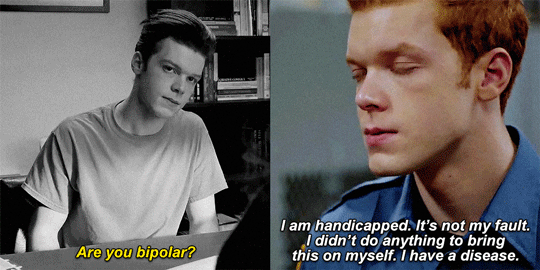


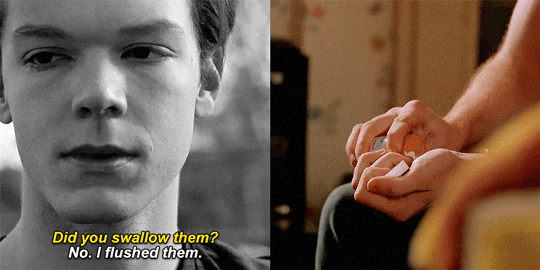
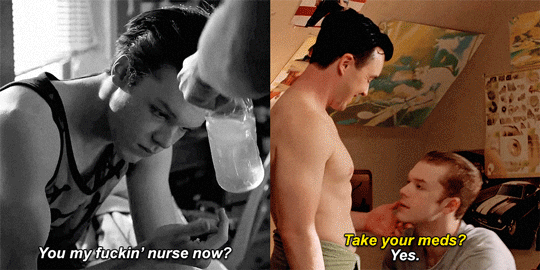


IAN GALLAGHER + his journey with bipolar disorder
╰┈➤ “At times, being bipolar can be an all-consuming challenge, requiring a lot of stamina and even more courage, so if you’re living with this illness and functioning at all, it’s something to be proud of, not ashamed of." - Carrie Fisher
#happy world bipolar day to all my bp babies#(more thoughts at the end of the tags)#shameless#shamelessnet#shamelessedit#ian gallagher#cameron monaghan#*macygifs#bipolar disorder#hello pals how are we doin#i made this gif set in july of 2023 and never posted it because 1) i was terrified to share it and potentially see Bad Takes in the tags#and 2) because my hyperfixation was waning. and while both of those things are still mostly true (the fixation comes and goes)#i feel like it's really important to share as ian's bipolar storyline was not only so vital to his character it was a bit of representation#that isn't often given to the disorder and those (like myself) who live with it every single day#world bipolar day is a day where we can both celebrate ourselves and our resilience and also raise awareness of the reality of the disorder#which is both terrifying and beautiful at its core. this disease is not a death sentence or a sentence to an unfulfilled and miserable life#while there are challenges galore when it comes to balancing life with this disorder it IS possible to live a full and productive life#and i think it's really important to have representation of that in media - and while shameless dropped the ball on a LOT of storylines#over the years THIS is the one they really fucking nailed and i am incredibly grateful#i first started watching shameless while in the midst of a major depressive episode and i was later (finally) diagnosed during an extended#hypo/manic episode - this show and ian's storyline got me through so much and made me feel so seen and validated in my struggles#world bipolar day is also vincent van gogh's birthday (happy birthday buddy) who was posthumously diagnosed with bipolar disorder#and who experienced both depressive and hypo/manic episodes during his lifetime (and was regularly institutionalized)#it takes a lot of help and support to keep us going. it takes the support of our family and friends and *most* of all#it takes patience and kindness and understanding - which is so so so easy to give if you are willing to love and listen#so please. be willing. listen to our stories. be patient with us. show us love without conditions. support us in any way you can.#we are worth it#i promise#anyway. that's really all i wanted to say. happy world bipolar day to those who celebrate (me) and may all of us living with this disorder#go on to live happy fulfilling beautiful magical lives
466 notes
·
View notes
Text
Represention of Autistic Frustration in Laios Dungeon Meshi
Like many other autistic people, I related strongly to Laios Touden while reading Dungeon Meshi. This post isn't going to spend time disputing whether he displays autistic traits or not—while I could do that, I want to focus on why specifically his portrayal struck a chord with me in a way the writing of most other autistic-coded characters has not.
Disclaimer: as the above suggests, this post is strongly informed by my own experiences as an autistic person, as well as the experiences of my neurodivergent friends with whom I have spoken about this subject. I want to clarify that in no way am I asserting my personal experience to be some Universal Autistic Experience. This post is about why Laios' character feels distinct and significant to me in regard to autistic representation, and while I'm at it, I do feel that I have interesting things to say about autistic representation in media generally. This also got a bit long, so I'm sticking it under a read more. Spoilers for up to the end of chapter 88 below.
The thing that stands out most to me in regard to Laios' characterisation is the open anger he displays when someone points out his inability to read other people. This comes up prominently in his interactions with "Shuro" (Toshiro Nakamoto):
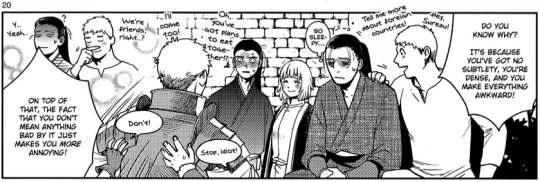
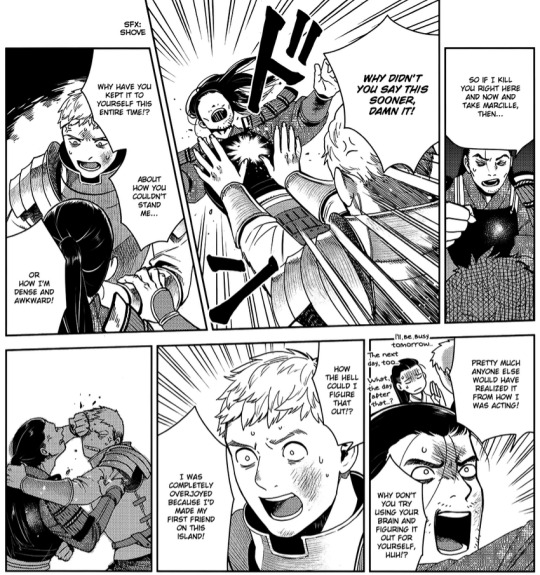
The frustration pictured above (Laios continuing to physically tussle with Toshiro, using crude language toward him) becomes even more notable when you remember that this is Laios, who, outside of these interactions, is not easily fazed and often exists as a lighthearted contrast to the rest of the cast. Then we get to Laios' nightmare.
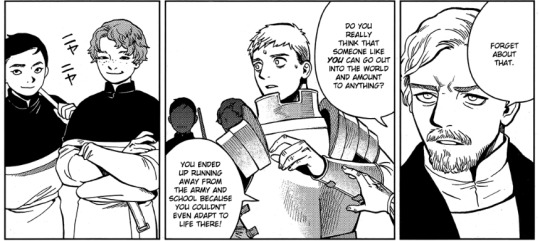

In Falin's words: "Nightmares love emotional wounds. Wounds you hold in your heart. Things that give you stress, or things that were traumatic for you. They aggravate memories like that and cause the dreamer to have terrible dreams." (chapter 42, page 10.) (damn. i'm properly citing for this post and everything.)
Thus, Laios' nightmare establishes an important fact: even if he is unable to recognise social blunders while he's making them, he's at least subconsciously aware that other people operate on a different wavelength to him, and that he's an outsider in many of his social circles (both past and present). His dream-father's disparaging words stress the impact this has had upon his ability to live up to the expectations set out for him, and we also get a panel of kids who smirk at him (presumably former bullies to some degree). Toshiro's appearance only hammers home how much Laios is still both humiliated and angered by his misunderstanding of their relationship.
I've thought a lot about anger as concomitant to the autistic experience. When autistic representation portrays ostracization, it's generally from an angle of the autistic character being upset at how conforming to neurotypical norms doesn't come easily to them; as a result, they express a desire to 'get better' at meeting neurotypical standards, a desire to become more 'normal' (whether the writing implies this is a good thing or not). In contrast, not once does Laios go, "I need to perform better in my social interactions, and try to care less about monsters, because that's what other people find weird." His frustration is directed outward rather than inward, and as a result, it's the people around him who are framed as nonsensical.
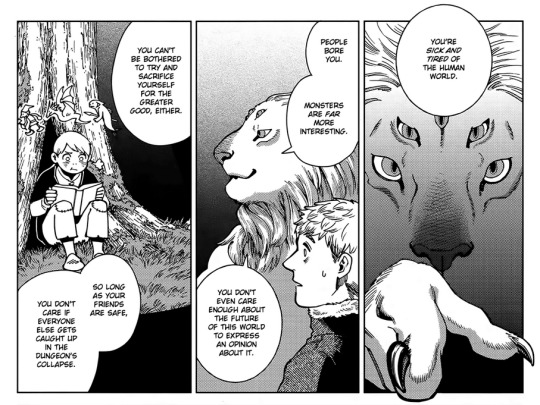
The Winged Lion starts delineating Laios' anger, and Laios' reaction is to think to himself, "It can sense all my thoughts, huh?" (chapter 88, page 16.) This is the scene that really resonated with me. I'm not saying I have never felt the desire to conform to neurotypical norms that is borne from insecurity, but primarily, I know that I don't want to work toward becoming 'normal'—I don't want to change myself for people who follow rules I find nonsensical. It's the difference between, "Oh god, why can't I get it," and, "WHY CAN'T YOU GET IT?" (phrasing here courtesy of my friend Miles @dogwoodbite). And for me personally, Dungeon Meshi is the first time I've seen this frustration and the resultant voluntary isolation from other people portrayed in media so candidly. Laios' anger is not downplayed or written to be easily palatable, either.
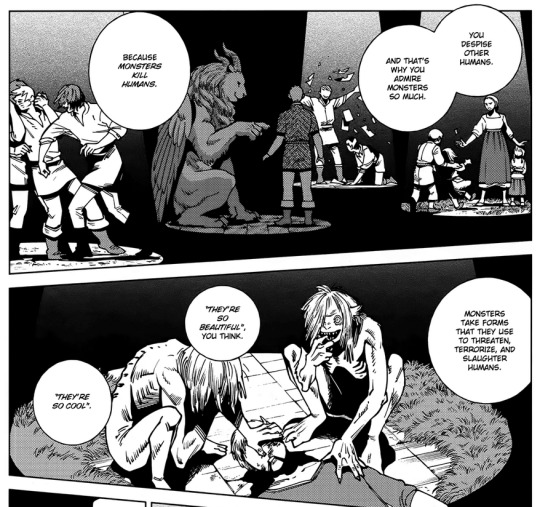
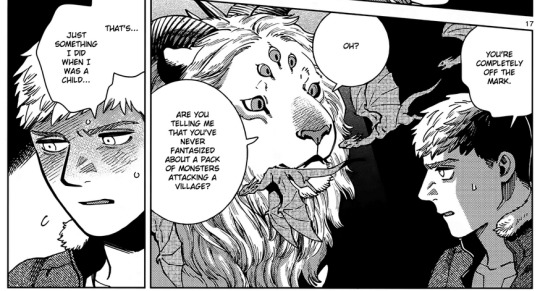
The culmination of Laios' frustrations in this scene wherein we learn that Laios has fantasised about "a pack of monsters attacking a village" drives home just how alienated he really feels. I need not go into his wish to become a monster himself, redolent of how many autistic people identify/have identified with non-humans to some degree as a result of a percieved disconnect from society (when I was younger, I wanted to be a robot. I still kind of do.)
Obviously, wishing death upon other people is a weighty thing, but the unfiltered nature of this page is what deeply resonated with me. The Winged Lion is laying Laios' deepest and most transgressive desires bare, and they are desires that are a product of lifelong ostracization by others (whether intentional or unintentional). This is the brand of anger I'm familiar with, and that my neurodivergent friends express being familiar with, but that I haven't seen portrayed in writing so explicitly before—in fact, it surprised me because most well-meaning autistic representation I've experienced veers toward infantilisation in trying make the autistic character's struggles easy for neurotypicals to sympathise with.
Let's also not neglect the symbolism inherent to Laios' daydream. "A pack of monsters attacking a village". Functionally, monsters are Laios' special interest—he percieves everything first and foremost through his passion for monsters. His daydream of monsters attacking—killing—humans, is fundamentally a daydream of the world he understands (monsters) overthrowing the world that is so illogical to him, that has repeatedly shunned him (other people). I joked to my friends that it's an autistic power fantasy, and it actually sort of is. And in it, his identity is aligned with that of the monsters, while his anger manifests in a palpable dissociation from the rest of humanity. This is one manga page. It's brief. It's also very, very raw to me. I think about it often.
To conclude, I love Laios Dungeon Meshi. This portrayal of open frustration in an autistic character meant a lot to me, and I hope I've sufficiently outlined why. Also, feel free to recommend media with autistic representation in the notes if you've read this far—I would really like to see if there is more of this nature. Thank you for reading. I'm very tired and should probably sleep now.
#dungeon meshi#dunmeshi#laios touden#shuro#toshiro nakamoto#the winged lion#autistic#autism#clay writes#i GUESS#this was so spur of the moment. im so busy right now i dont have time to be analysing laios touden#i wuont angry autistic rep..
8K notes
·
View notes
Text
every once in a while it really just hits me how important representation is
#like I talk about it a lot with my sister especially in regards to lgbtq+ rep#but every once in a while I really feel it you know?#And sometimes it reminds me that it’s not just the obvious ones (race sexuality etc) that are important#Sometimes even just small things like seeing a character with freckles or glasses goes a long way#And even in small projects it does a lot of good#Like I was only even thinking about this because I read a fanfic and a character I really love was written as having scoliosis#And I have scoliosis as well- and just stumbling across that in an unrelated fic made me so ridiculously happy#It’s honestly such an amazing feeling to see characters that you love or relate to or look up to have some of these same traits that you do#Especially the ones that aren’t shown a lot in media#Idk where I’m going with this#But thank you to fic writers and every other creative out there who includes some sort of representation in their work whether big or small#It is definitely appreciated!#fanfiction#rambling#representation
1 note
·
View note
Note
I wanted to thank you for the Good Omens S2E2 “A Companion to Owls” “minisode” which I found personally very moving as something that stands on its own (independent of the season 2 arc or the relationship arc in the show).
The choice to do what is right in real life is a hard one. It keeps you up at night, makes you grind your teeth, wring your hands, pace the floors. Depending on the situation, the pressures can be enormous, and frankly terrifying. And yes, the reality is that once you have made your decision, doing what is right can indeed be very, very lonely. It has consequences, and even if you form temporary alliances, in my own experience, potential consequences are still faced alone (whether in the impact on one’s career, or personal life, etc.). Doing the right thing usually does *not* get you a gold star or a pat on the back.
As someone past the half-century mark now who has found myself in these circumstances a number of times before in life, I cannot even begin to express how important it was to me to see this represented in mainstream media like this, and that we were allowed to sit with that feeling, that struggle. When Aziraphale is looking out at the sea, in that last scene, I looked at his face and said to myself “I *know* that, exactly that, right there, I have felt that. Someone else understands.”
Thank you so much for what you have created (along with thanks to all those who have worked to bring it to life – especially Michael Sheen whose performance I found so moving). Watching “A Companion to Owls” has offered a sort of peace in its representation of that struggle, and I think about it often. It is what I needed, when I needed it.
While I thank you, your thanks really are for John Finnemore, who wrote the Job story and wrote it so beautifully.
2K notes
·
View notes
Text
Best of YouTube 2023
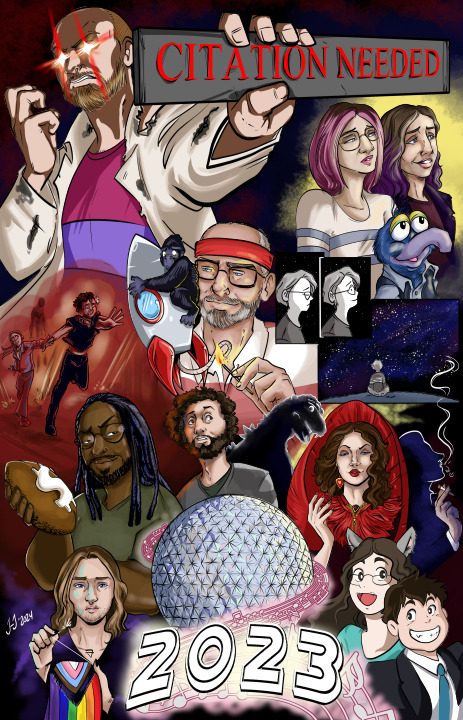
Yes, I did spend the first week and change of January on this. I wish I could have had it done for New Years, but too many people came out with incredible work in December, so waiting turned out for the best.
What these creators do are a huge influence on my life, I would honestly have difficulty doing what I do without them. That isn't to say that my favorites of the year are *only* on this image--It was almost impossible to narrow down my favorites. Many creators I wanted to include couldn't fit on a single page, and too many of them made more than one video I wished I could draw too!
But, to all of you, thank you for what you do. You're an inspiration.
For those who don't know, further is an explanation.
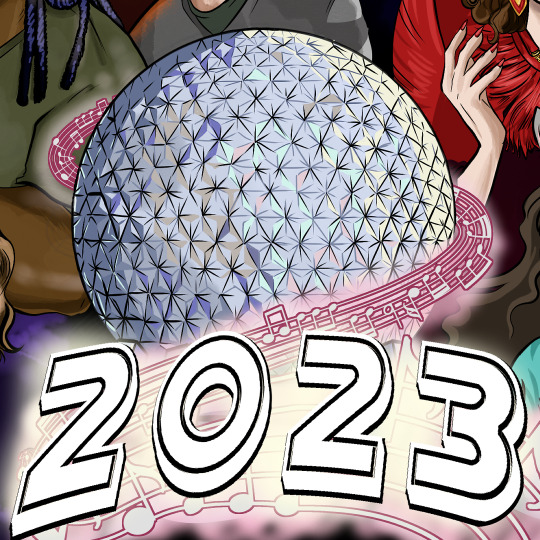
At the bottom center is an artistic masterpiece by Defunctland: "Journey to EPCOT Center: A Symphonic History." Over the last several years, Defunctland has risen from delightfully-entertaining commentary on decommissioned theme park attractions to occasionally dropping profound statements on the creation of art itself. "Journey to EPCOT Center: A Symphonic History" is worth treating like the cinematic experience it is: No second screen, you sit your ass down in front of a TV, set down the phone, and then you *watch it.* Any Disney, theme park, or independent film fan needs to pay attention to this one.
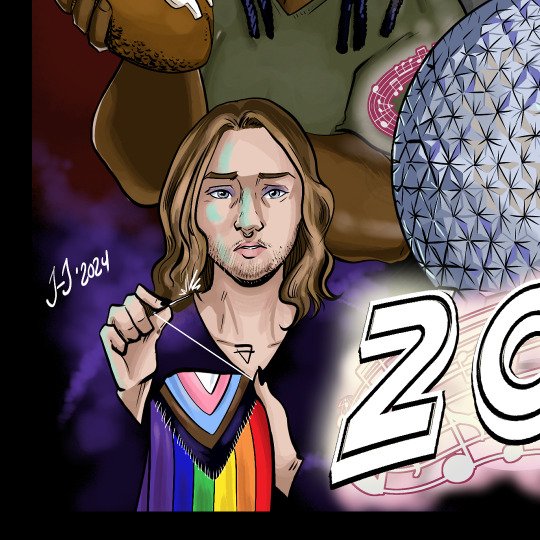
Bottom left is Caelan Conrad with their piece "Drop the T - The Deadly Consequences of Gay Respectability Politics." While I do think they've done more visually or artistically-daring pieces before, "Drop the T" is one of the most important videos released on YouTube in today's current climate of hate. We as queer folk (and our allies) need to understand how integral every identity of the queer experience has been since the start of the Civil Rights movement (and before!). While we are not identical, we *are* inseparable, and we deserve having our real history easily accessible.
TERFs and other conservative mouthpieces need not reply. Your opinions are trash. 😘
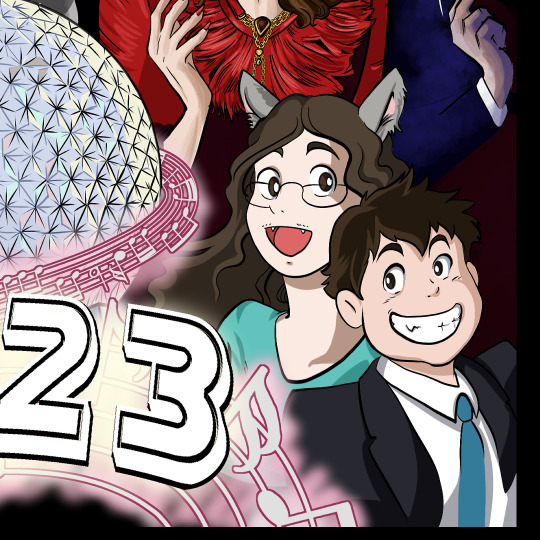
I cannot stop watching and rewatching this video by @patricia-taxxon, "On the Ethics of Boinking Animal People." It's not just a defense of furry fandom and its eccentricities, it's a thoughtful and passionate analysis of what the artform achieves that purely human representation can't. Patricia goes outside of her usual essay format to directly speak to the viewer about the elements that define furry media (the most succinct definition I've ever heard) and just how *human* an act loving animal cartoons really is.
As an artist who can draw furry characters, but never really got into erotic furry art, this video is a treasure. Why did I choose to have her drawn as a Ghibli character, hanging out with one of the tanukis from "Pom Poko?" Guess you'll have to watch, bruh.
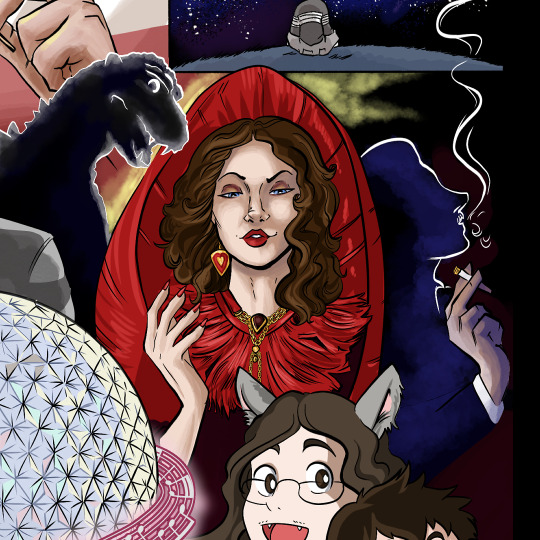
Philosophy Tube continuously puts out videos that I would put on this list--I'm not even sure that "A Man Plagiarised my Work: Women, Money, and the Nation" is the best work she released in 2023. However, this video got many conversations going between myself and my partner, and the twist on the tail end of the video shocked us both to such a degree that I had no choice.
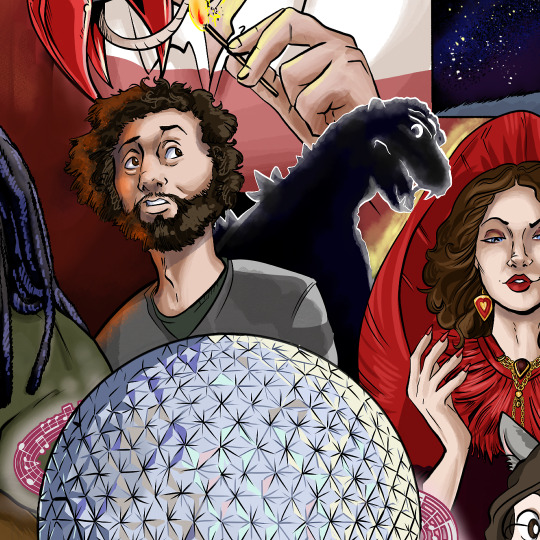
At the very tail end of the year, Big Joel released "Fear of Death." On his Little Joel channel, he described it as the singularly best video he's ever done, and I'm inclined to agree. However, for this illustration, I ended up repeatedly going back to a mini-series he did earlier in the year: "Three Stories at the End of the World." All three videos are deeply moving and haunting, and I was brought to tears by "We Must Destroy What the Bomb Cannot." While it may be relatively-common knowledge that the original Gojira (Godzilla) film is horror grappling with the devastation America's rush to atomic dominance inflicted on Japan, Big Joel still manages to bring new words to the discussion. Please watch all three of the videos, but if, for some reason, you must have only one, let it be "We Must Destroy What the Bomb Cannot."
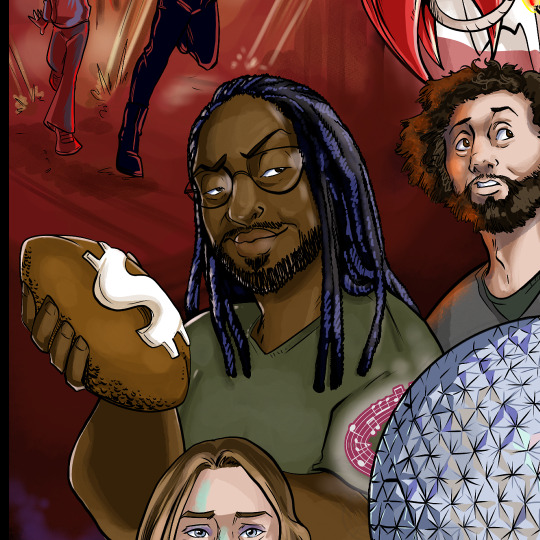
Y'all. Let me confess something. I hate football. I hate watching it, I associate seeing it from the stadiums with some of my worst childhood experiences, I despise collegiate and professional football (as institutions that destroy bodies and offer up children at the feet of its alter as a pillar of American culture)--
I. L o a t h e. Football.
But.
F.D. Signifier could get me to watch an entire hour-plus essay on why I should at least give a passing care. AND HE DID IT. I might think "F*ck the Police," the two-parter on Black conservatism, or his essay on Black men's connection to anime might be "better" videos, but this writer did the impossible and held my limited attention span towards football long enough to make a sincere case for NFL players--and reminds us that millionaires can *in fact* be workers. That alone is testament to his skill.
Sit down and watch "The REAL Reason NFL Running Backs Aren't Getting Paid." Any good anti-capitalist owes it to themselves.
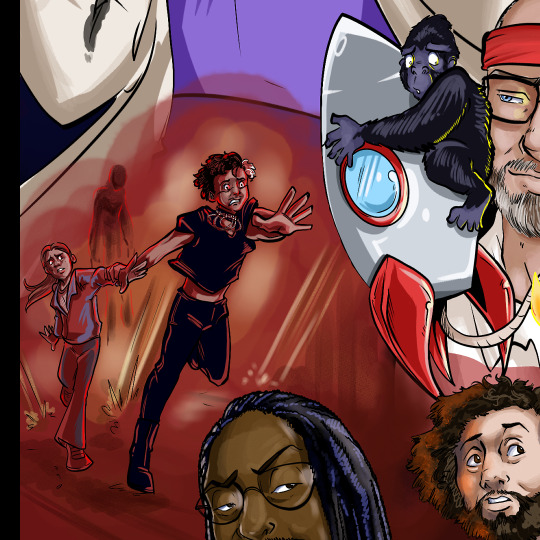
CJ the X continuously puts out stunning, emotional videos, and can do it with the most seemingly-inconsequential starting points. A 30 second song? An incestuous commercial? Five minutes of Tangled? Sure, why not. Go destroy yourself emotionally by watching them. I'm serious. Do it.
Their video Stranger Things and the Meaning of Life manages to to remind us all why the way we react to media does, in fact, matter. Yes, even nostalgia-driven, mass-media schlock. Yes, how we interact with media matters, what it says about us matters, and we all deserve to seek out the whys.
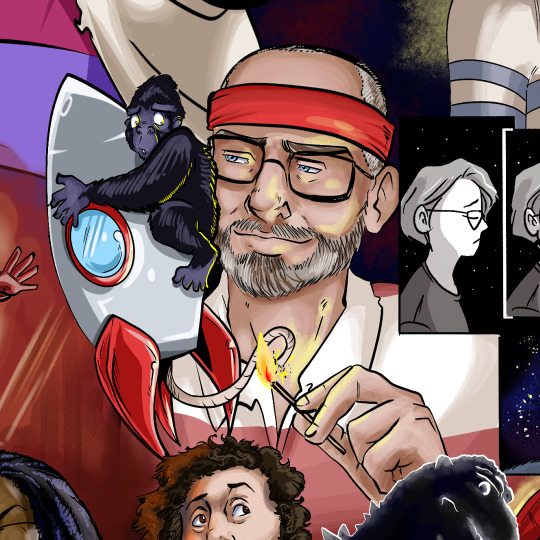
Folding Ideas has spent the last few years articulating exactly why so much of our modern world feels broken, and because of that his voice continuously lives rent-free in my brain. While the tricks that scam artists and grifters use to try to swindle us are never new, the advancement of technology changes the aesthetics of their performances. Portions of Folding Ideas' explanations might seem dry when going into detail of how stocks work in This is Financial Advice, but every bit of it is necessary to peel back the layers of techno-babble and jargon and make sense of the results of "Meme Stocks."
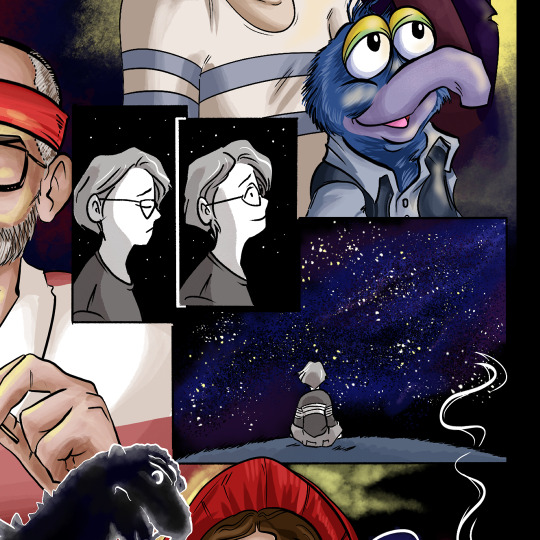
Jessie Gender puts out nothing but bangers, her absolute unit of a video about Star Wars might be my new favorite thing ever, but none of her work hit so profoundly in 2023 than the two-parter "The Myth of 'Male Socialization'" and "The Trauma of Masculinity." There's so much about modern life that isolates and traumatizes us, and so much of it is just shrugged off as "normal." We owe it to ourselves to see the world in more vivid a color palette than we're initially given.
Panels drawn after Kate Beaton and "Ducks: Two Years in the Oil Sands."

"This is Not a Video Essay" is one of the most intense and beautiful pieces of art I've ever put into my eyeballs. Why do we create? What drives us to connect?
I don't even know what else to say about the Leftist Cooks' work, it repeatedly transcends the medium and platform. Watch every single one of their videos, but especially this one.
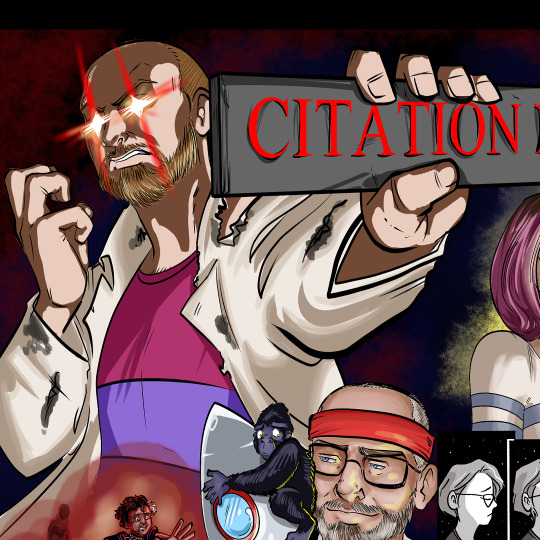
The likelihood you are terminally online and yet haven't heard of Hbomberguy's yearly forrays into destroying the careers of awful people is pretty slim. Just because it has millions of views doesn't mean that Hbomberguy's "Plagiarism and You(Tube)" isn't worth the hype. Too long? Shut up, it has chapters and YouTube holds your place, anyway. You think a deep dive into a handful of creators is only meaningless drama? Well, you're wrong, you wrong-opinion-haver. Plagiarism is an *everyone* problem because of the actual harm it creates--the history it erases, the labor it devalues, the art it marginalizes--which you would know if you watched "Plagiarism and You(Tube)".
Watch. The damn. Video.
In fact, watch all of them!
Thanks for reading this if you did.
#fanart#digital art#caricature#kate beaton#ducks#stranger things#apes#youtube#2023#best of 2023#video essay#hbomberguy#leftist cooks#cj the x#big joel#jessie gender#folding ideas#dan olson#jessie earl#neil and sarah#fd signifier#f.d. signifier#little joel#gojira#godzilla#philosophy tube#abigail thorn#caelan conrad#patricia taxxon#defunctland
927 notes
·
View notes
Text
The other day one of my friends was like “Where on earth do you hear about all the books you read?” and I’m honestly trying to think about that because I don’t really pay attention to Booktube, Booktok, Book Twitter, or Bookstagram, only occasionally dip back into book blogging, and mostly use Goodreads as a place to track books I want to read or have read rather than searching for recommendations, so I’m trying to make a list of the places I hear about books from besides a few trusted social media mutuals.
Tor.com is one major place I hear about science fiction and fantasy books–they do deal announcements, cover reveals, lists of new releases, and reviews, as well as columns reviewing backlist work. I really like “The Book Queered Me,” for instance, which is people looking back on books that were important to their understand of identity.
The Book Smugglers isn’t really that active anymore, but they reviewed science fiction and fantasy media, as well as publishing essays and short fiction and I read them religiously for a long time.
Book Riot I read occasionally and they publish bookish news and essays. I forgot I was subscribed to their LGBTQ+ book newsletter for a while and went through the emails I’d been sent earlier this week and that particular newsletter is nice because it highlights a couple books and does a round-up of recent news about queer books.
Austraddle’s book section, especially the Rainbow Reading column, does reviews, interviews, and news related to queer books, mostly queer women. It’s helpful for non-SFF stuff because I’m usually very up-to-date on news in the science fiction and fantasy world but they cover poetry, nonfiction, romance, etc.
We Need Diverse Books is a great resources, of course, and I really like the interviews they do with authors of recent releases.
LGBTQ Reads is an invaluable resource for queer literature–new release highlights, author interviews, lists of books by representation or age/genre if you’re looking for something specific.
Electric Literature is where I hear about more adult lit fic/nonfiction stuff, they also have a column called Novel Gazing in which people write about books that have impacted them and I find that really interesting. They also publish poetry and short fiction but I haven’t read much of that.
The Lesbrary does reviews of books about lesbian and bisexual women, as well as round-ups of new releases. Good resource for keeping up with sapphic books.
Rich in Color reads and reviews diverse YA books and is a good place to keep up with books by authors of color.
#will add more of i think of them#there are also websites i still miss like disability in kidlit and yainterrobang#but they're not active anymore#lulu speaks#lulu reads#books
8K notes
·
View notes
Text
The Mask Trope, and Disfiguremisia in Media
[large text: The Mask Trope, and Disfiguremisia in Media]
If you followed this blog for more than like a week, you're probably familiar with “the mask trope” or at least with me complaining about it over and over in perpetuity. But why is it bad and why can't this dude shut up about it?
Let's start with who this trope applies to: characters with facial differences. There is some overlap with blind characters as well; think of the blindfold that is forced on a blind character for no reason. Here is a great explanation of it in this context by blindbeta. It's an excellent post in general, even if your character isn't blind or low vision you should read at least the last few paragraphs.
Here's a good ol’ tired link to what a facial difference is, but to put it simply:
If you have a character, who is a burn survivor or has scars, who wears a mask, this is exactly this trope.
The concept applies to other facial differences as well, but scars and burns are 99% of the representation and “representation” we get, so I'll be using these somewhat interchangeably here.
The mask can be exactly what you think, but it refers to any facial covering that doesn't have a medical purpose. So for example, a CPAP mask doesn't count for this trope, but a Magic Porcelain Mask absolutely does. Bandages do as well. If it covers the part of the face that is “different”, it can be a mask in the context used here.
Eye patches are on thin ice because while they do serve a medical purpose in real life, in 99.9% of media they are used for the same purpose as a mask. It's purely aesthetic.
With that out of the way, let's get into why this trope sucks and find its roots. Because every trope is just a symptom of something, really.
Roughly in order of the least to most important reasons...
Why It Sucks
[large text: Why It Sucks]
It's overdone. As in — boring. You made your character visibly different, and now they're no longer that. What is the point? Just don't give them the damn scar if you're going to hide it.
Zero connection with reality. No one does this. I don't even know how to elaborate on this. This doesn't represent anyone because no one does this.
Disability erasure. For the majority of characters with facial differences, their scars or burns somehow don't disable them physically, so the only thing left is the visible part… aaand the mask takes care of it too. Again, what's the point? If you want to make your disabled character abled, then just have them be abled. What is the point of "curing" them other than to make it completely pointless?
Making your readers with facial differences feel straight up bad. I'm gonna be honest! This hurts to see when it's all you get, over and over. Imagine there's this thing that everyone bullied you about, everyone still stares at, that is with you 24/7. Imagine you wanted to see something where people like you aren't treated like a freakshow. Somewhat unrealistic, but imagine that. That kind of world would only exist in fiction, right? So let's look into fiction- oh, none of the positive (or at least not "child-murderer evil") characters look like me. I mean they do, but they don't. They're forced to hide the one thing that connects us. I don't want to hide myself. I don't want to be told over and over that this is what people like me should do. That this is what other people expect so much that it's basically the default way a person with a facial difference can exist. I don't want this.
Perpetuating disfiguremisia.
"Quick" Disfiguremisia Talk
[large text: "Quick" Disfiguremisia Talk]
It's quick when compared to my average facial difference discussion post, bear with me please.
Disfiguremisia; portmanteau of disfigure from “disfigurement” and -misia, Greek for hatred.
Also known as discrimination of those mythical horrifically deformed people.
It shows up in fiction all the time; in-universe and in-narrative. Mask trope is one of the most common* representations of it, and it's also a trope that is gaining traction more and more, both in visual art and writing. This is a trope I particularly hate, because it's a blatant symptom of disfiguremisia. It's not hidden and it doesn't try to be. It's a painful remainder that I do not want nor need.
*most common is easily “evil disfigured villain”, just look at any horror media. But that's for another post, if ever.
When you put your character in a mask, it sends a clear message: in your story, facial differences aren't welcome. The world is hostile. Other characters are hostile. The author is, quite possibly, hostile. Maybe consciously, but almost always not, they just don't think that disfiguremisia means anything because it's the default setting. No one wants to see you because your face makes you gross and unsightly. If you have a burn; good luck, but we think you're too ugly to have a face. Have a scar? Too bad, now you don't. Get hidden.
Everything here is a decision that was made by the author. You are the one who makes the world. You are the person who decides if being disabled is acceptable or not there. The story doesn't have a mind of its own, you chose to make it disfiguremisic.
It doesn't have to be.
Questions to Ask Yourself
[large text: Questions to Ask Yourself]
Since I started talking about facial differences on this blog, I have noticed a very specific trend in how facial differences are treated when compared to other disabilities. A lot of writers and artists are interested in worldbuilding where accessibility is considered, where disabled people are accepted, where neurodivergence is seen as an important part of the human experience, not something “other”. This is amazing, genuinely.
Yet, absolutely no one seems to be interested in a world that is anything but cruel to facial differences. There's no escapist fantasies for us.
You see this over and over, at some point it feels like the same story with different names attached.
The only way a character with a facial difference can exist is to hide it. Otherwise, they are shamed by society. Seen as something gross. I noticed that it really doesn't matter who the character is, facial difference is this great equalizer. Both ancient deities and talking forest cats get treated as the same brand of disgusting thing as long as they're scarred, as long as they had something explode in their face, as long as they've been cursed. They can be accomplished, they can be a badass, they can be the leader of the world, they can kill a dragon, but they cannot, under any circumstances, be allowed to peacefully exist with a facial difference. They have to hide it in the literal sense, or be made to feel that they should. Constantly ashamed, embarrassed that they dare to have a face.
Question one to ask yourself: why is disfiguremisia a part of your story?
I'm part of a few minority groups. I'm an immigrant, I'm disabled, I'm queer. I get enough shit in real life for this so I like to take a break once in a while. I love stories where transphobia isn't a thing. Where xenophobia doesn't come up. But my whole life, I can't seem to find stories that don't spew out disfiguremisia in one way or the other at the first possible opportunity.
Why is disfiguremisia a default part of your worldbuilding? Why can't it be left out? Why in societies with scarred saviors and warriors is there such intense disgust for them? Why can't anyone even just question why this is the state of the world?
Why is disfiguremisia normal in your story?
Question two: do you know enough about disfiguremisia to write about it?
Ask yourself, really. Do you? Writers sometimes ask if or how to portray ableism when they themselves aren't disabled, but no one bothers to wonder if maybe they aren't knowledgeable enough to make half their story about their POV character experiencing disfiguremisia. How much do you know, and from where? Have you read Mikaela Moody or any other advocates’ work around disfiguremisia? Do you understand the way it intersects; with being a trans woman, with being Black? What is your education on this topic?
And for USAmericans... do you know what "Ugly Laws" are, and when they ended?
Question three: what does your story associate with facial difference — and why?
If I had to guess; “shame”, “embarrassment”, “violence”, "disgust", “intimidation”, “trauma”, “guilt”, “evil”, “curse”, “discomfort”, “fear”, or similar would show up.
Why doesn't it associate it with positive concepts? Why not “hope” or “love” or “pride” or “community”? Why not “soft” or “delicate”? Dare I say, “beauty” or “innocence”? Why not “blessing”? “Acceptance”?
Why not “normal”?
Question four: why did you make the character the way they are?
Have you considered that there are other things than “horrifically burned for some moral failing” or “most traumatic scenario put to paper”? Why is it always “a tough character with a history of violence” and never “a Disfigured princess”? Why not “a loving parent” or “a fashionable girl”, instead of “the most unkind person you ever met” and “total badass who doesn’t care about anything - other than how scary their facial difference is to these poor ableds”? Don’t endlessly associate us with brutality and suffering. We aren’t violent or manipulative or physically strong or brash or bloodthirsty by default. We can be soft, and frail and gentle and kind - and we can still be proud and unashamed.
Question five: why is your character just… fine with all this?
Can’t they make a community with other people with facial differences and do something about this? Demand the right to exist as disabled and not have to hide their literal face? Why are they cool with being dehumanized and treated with such hatred? Especially if they fall into the "not so soft and kind" category that I just talked about, it seems obvious to me that they would be incredibly and loudly pissed off about being discriminated against over and over... Why can't your character, who is a subject of disfiguremisia, realize that maybe it's disfiguremisia that's the problem, and try to fix it?
Question six: why is your character wearing a mask?
Usually, there's no reason. Most of the time the author hasn't considered that there even should be one, the character just wears a mask because that's what people with facial differences do in their mind. Most writers aren't interested in this kind of research or even considering it as a thing they should do. The community is unimportant to them, it's not like we are real people who read books. They think they understand, because to them it's not complex, it's not nuanced. It's ugly = bad. Why would you need a reason?
For cases where the reason is stated, I promise, I have heard of every single one. To quote, "to spare others from looking at them". I have read, "content warning: he has burn scars under the mask, he absolutely hates taking it off!", emphasis not mine. Because "he hates the way his skin looks", because "they care for their appearance a lot" (facial differences make you ugly, remember?). My favorite: "only has scars and the mask when he's a villain, not as a hero", just to subtly drive the point home. This isn't the extreme end of the spectrum. Now, imagine being a reader with a facial difference. This is your representation, sitting next to Freddy Krueger and Voldemort.
How do you feel?
F.A.Q. [frequently asked questions]
[large text: F.A.Q. [frequently asked questions]]
As in, answers and “answers” to common arguments or concerns.
“Actually they want to hide their facial difference” - your character doesn’t have free will. You want them to hide it. Again; why.
“They are hiding it to be more inconspicuous!” - I get that there are elves in their world, but there’s no universe where wearing a mask with eye cutouts on the street is less noticeable than having a scar. Facial differences aren’t open wounds sprinkling with blood, in case that's not clear.
“It’s for other people's comfort” - why are other characters disfiguremisic to this extent? Are they forcing all minorities to stay hidden and out of sight too? That’s a horrible society to exist in.
“They are wearing it for Actual Practical Reason” - cool! I hope that this means you have other characters with facial differences that don’t wear it for any reason.
"It's the character's artistic expression" - I sure hope that there are abled characters with the same kind of expression then.
“They’re ashamed of their face” - and they never have any character development that would make that go away? That's just bad writing. Why are they ashamed in the first place? Why is shame the default stance to have about your own face in your story? I get that you think we should be ashamed and do these ridiculous things, but in real life we just live with it.
"Now that you say that it is kinda messed up but I'm too far into the story please help" - here you go.
“[some variation of My Character is evil so it's fine/a killer so it fits/just too disgusting to show their disability” - this is the one of the only cases where I’m fine with disability erasure, actually. Please don’t make them have a facial difference. This is the type of harm that real life activists spend years and decades undoing. Disfiguremisia from horror movies released in the 70s is still relevant. It still affects people today.
"But [in-universe explanation why disfiguremisia is cool and fine actually]" - this changes nothing.
Closing Remarks
[large text: Closing Remarks]
I hope that this post explains my thoughts on facial difference representation better. It's a complicated topic, I get it. I'm also aware that this post might come off as harsh (?) but disfiguremisia shouldn't be treated lightly, it shouldn't be a prop. It's real world discrimination with a big chunk of its origins coming out of popular media.
With the asks that have been sent regarding facial differences, I realized that I probably haven't explained what the actual problems are well enough. It's not about some technical definition, or about weird in-universe explanations. It's about categorizing us as some apparently fundamentally different entity that can't possibly be kind and happy, about disfiguremisia so ingrained into our culture that it's apparently impossible to make a world without it; discrimination so deep that it can't be excised, only worked around. But you can get rid of it. You can just not have it there in the first place. Disfiguremisia isn't a fundamental part of how the world works; getting rid of it won't cause it to collapse. Don't portray discrimination as an integral, unquestionable part of the world that has to stay no matter what; whether it's ableism, transphobia, or Islamophobia or anything else. A world without discrimination can exist. If you can't imagine a world without disfiguremisia in fiction... that's bad. Sad, mostly. To me, at least.
Remember, that your readers aren't going to look at Character with a Scar #14673 and think "now I'm going to research how real life people with facial differences live." They won't, there's no inclination for them to do so. If you don't give them a reason, they won't magically start thinking critically about facial differences and disfiguremisia. People like their biases and they like to think that they understand.
And, even if you're explaining it over and over ;-) (winky face) there will still be people who are going to be actively resistant to giving a shit. To try and get the ones who are capable of caring about us, you, as the author, need to first understand disfiguremisia, study Face Equality, think of me as a human being with human emotions who doesn't want to see people like me treated like garbage in every piece of media I look at. There's a place and time for that media, and if you don't actually understand disfiguremisia, you will only perpetuate it; not "subvert" it, not "comment" on it.
I hope this helps :-) (smile emoji. for good measure)
Mod Sasza
#mod sasza#disfiguremisia#face difference#mask trope#writing trope#writing resource#writing reference#writing resources#writing advice#writeblr#writing tips#long post#burn survivor representation
370 notes
·
View notes
Text
Toph Beifong doesn’t hold up as disability representation - Disability in the Media
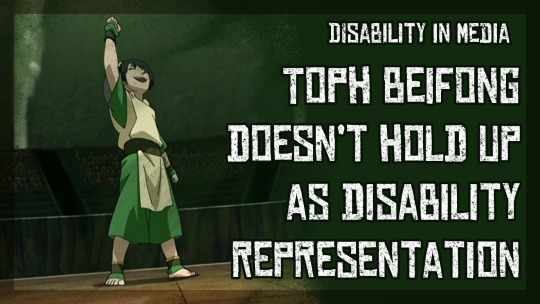
[ID: A screenshot of Toph, a twelve-year-old girl with black hair in a loose, green and tan short-sleeve shirt and shorts, cheering in an arena. Next to text written in a rough, blocky font: "Disability in Media - Toph Beifong Doesn't hold up as disability representation" /End ID]
Avatar the Last Airbender is one of my all-time favourite TV-shows, and Toph is still easily one of my favourite members of Team Avatar. I was a few years younger than Toph when the show first started airing, and being a disabled kid who was into martial arts, constantly being dismissed by my able-bodied opponents and teachers, meant that I connected very strongly with her right from the get-go.
But upon my last couple of rewatches of the series, I began to come to the realisation that my opinions on Toph as a shining example of good disability representation were... well, pretty heavily influenced by my nostalgia for the show and that many aspects of Toph's character just don't hold up today. Which, honestly is fair, the show is nearly 19 years old (if it were a person in my country, it would be old enough to drink) and I think it's pretty ridiculous to expect every part of every character from an 19 year old show to age well. So today I wanted to talk about the things I think Avatar the original Last Airbender did right with Toph, where I think they missed the mark, and what changes I think would need to be made to Toph to make her work for a modern audience.
So let's start with why I think Toph doesn't really hold up as "good disability representation" today, and the elements of her character that just haven't aged as well.
For me, one of the biggest issues I noticed upon rewatching the show, is how often we are told (often by Toph herself) that she is blind, but how infrequently we are actually shown it's impact on her life beyond her bending or outside of jokey contexts. Outside of her bending, we only ever see her blindness impacting her ability to do things like read or write, otherwise, she functionally has full vision -so far as the audience is informed - with the only exceptions being when she's in the air or water (e.g. on Appa or in the submarines) or in loose soil (e.g. the desert). Having places and circumstances where she doesn't have access to her power that allows her to "see" was a step in the right direction, but I do think it would have been better if her seismic sense wasn't quite as accurate, even in the most ideal of circumstances.
But why? Well, I think Suki explains it really well, long before Toph is even introduced. when Sokka says "I should have seen you as a warrior instead of a girl" Suki stops him and says "I am a warrior, but I'm also a girl". Being a warrior and a woman are both important parts of Suki's character, and only recognising her as one or the other means ignoring a big part of who she is, and the same is true for Toph. Being blind is a big part of toph's character that has informed a lot of her life, but so is being a warrior and bending master. Many people see Toph as a warrior or fighter, but ignore her disability, but both are important. She's disabled, and a warrior, and those things don't cancel each other out, the same way being a warrior doesn't diminish Suki's status as a woman.
When the show was still airing though (and even still today) it was very common to see non-disabled fans of the show exclaiming that they honestly forget that Toph is even blind sometimes, with many people going so far as to say that she's not even disabled (and that this was a good thing). While I do think some of that comes from the fact they weren't used to seeing a disabled character as both disabled and an active participant in these kinds of stories, I do think this mostly happened because of the show's lack of, well, showing the impact of her blindness on her daily life and allowing her earthbending and seismic sense to erase the effects of her disability to some extent. It's much harder to forget a character is blind when it impacts their daily life in ways that are shown to the audience. This doesn't have to be in big, showy ways mind you, showing things subtly but consistently works way better than one "very special episode" type setup.
In the show as it is though, the seismic sense functionally gives Toph a perfect image of her surroundings until it's just not available anymore for *plot reasons*.
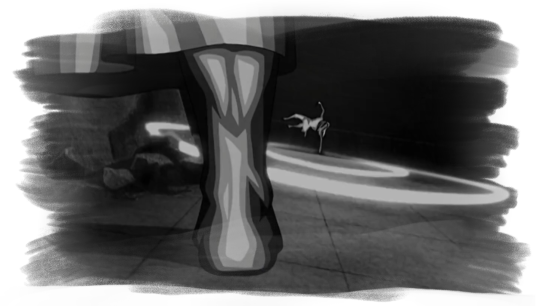
[ID: A black and white shot of Toph and how she sees the oponent she's fighting, with shockwaves radiating from him towards her to indicate how she's interpreting the scene. Her foe has jumped into the air and now has his hand dug into the ground of an arena, about to launch rocks towards her. /End ID]
In many ways, her picture of the world is better and clearer than what the non-disabled characters can see, leading to this feeling of her disability being erased. It may have been better though if the seismic sense could give her a general idea of big things in her immediate vicinity but she still missed the finer details, functioning at least a little bit more like a tactile/earthy-vibration version of the limited sight some legally-blind people have in real life. Things like a person's position, movement and overall pose would still be "visible" to her in a general sense, as well as big things in the environment (including things underground, since there are a few plot-points that require that), but smaller things like details about objects and creatures, people's facial expressions or what they're doing with parts of their body that have no direct contact with the ground (like their hands) is less clear.
On top of this, she may struggle to detect smaller, lighter objects or creatures that realistically wouldn't cause much of a vibration at all. creatures as small and as light as Momo and Hawky for example might be detectable, but "fuzzy" to her, and anything smaller might make enough of a vibration to tell her it's there when it moves, but not enough for her to be able to tell what specifically it is without some other cue (such as sound). There are a few moments in the show that seem to imply this is what they were initially going for, but it's not really consistent, and is directly contradicted in her debut episode, "the blind bandit" when she explains that she can even "see" something as small as the ants off in the distance.
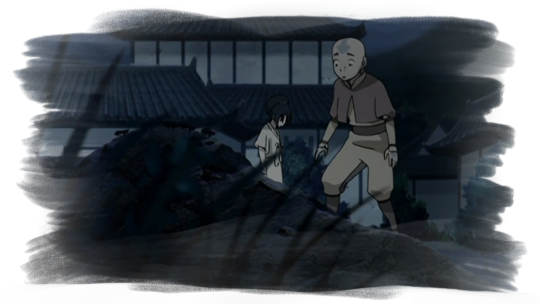
[ID: A shot of Aang, a twelve-year-old bald boy with an arrow tattoo on his head, dressed in a yellow and orange outfit, standing with Toph at night. In the foreground is an anthill will a trail of ants, which Aang is looking for. /End ID]
With an adjustment like what I'm suggesting though, she still serves her narrative purpose of teaching Aang the importance of being able to wait and listen - possibly even more so, as her needing to wait and collect more information in order to get a clearer image before striking, would back-up what Bumi tells Aang that he needs in an earth bending master. It would also still help to illustrate the connectedness of the world, a theme Toph continues to embody heavily in The Legend of Korra, while still showing the ways her disability impacts her more frequently.
When I talked about the "super-crip" trope a while back, I mentioned that one way to avoid the more harmful elements of the trope (where the character's disability is erased by their powers) is to use the ability in question more like a mobility or disability aid than a straight-up cure. The power should help them, but shouldn't make their disability redundant. People are creative and we would find ways to use a superpower or magic to help with our disabilities if it were available in real life, but what's the point of including a disabled character if you're just going to functionally erase their disability? For a character like Toph, I think this is the kind of approach that should be taken with her. Her seismic sense still helps her, but it's not a perfect replacement. (Ironically, I did use Toph as a "good" example of that trope, but I do think after this last rewatch, for the reasons I'm discussing here, I might have to backtrack that a bit).
I considered giving an alternative approach here, to keep the sensitivity of toph's seismic sense as it is in the show as is, but giving it draw-backs such as making her susceptible to sensory overload similar to what autistic people experience. However, while replacing one disability with another can work for some characters and stories, I don't think it's the best adjustment to make for Toph or any blind character, largely thanks to this also being a trope. The "blind (or d/Deaf) person who's other senses become super-human to make up for it" trope is very common in fantasy, sci-fi as well as older martial arts films, and while I'm not really the best person to cover it, I do know that members of both the blind and deaf communities have expressed a lot of frustration with it. Toph already falls into this trope quite a bit, and any suggestions I could make would have just dialled that element up to 11, and fixing one problem with another is never a good idea.
Another thing that actually did bug me for a while, even before my most recent rewatch of the show, is how Toph is treated on the rare occasions she does point out something won't working for her. There are a number of times where Toph advocates for herself and points out that something The Gaang is doing isn't accessible to her or sets a boundary to do with her disability, and she's either left behind, her concerns are brushed off or she's ignored entirely. The three most noticeable examples of this are in the Episodes "The Ember Island Players," "The Library," and Toph and Katara's segment of "Tales of Ba Sing Se."
In the Ember Island Players, Toph complains that the seats they have for the play are too high up and too far away, and she's unable to "see" what's happening on stage. Her friends don't really take any notice of her though except for Katara who tells her not to worry, "I'll tell your feet what's happening."

[ID: A shot of Katara, a fourteen-year-old girl with long brown hair and blue eyes, sitting with Toph, who is sitting with her arms crossed, annoying in a theatre seat. Both Toph and Katara are wearing red and gold, fire-themed outfits. Katara is looking at something off-screen. /End ID]
My problem here is that this particular kind of situation is something that is familiar to a lot of disabled people. Even the least independent disabled people I know get annoyed when their access needs or requests for accommodations, even among friends, are ignored and their pushback is brushed off with "don't worry, I'll just help you!" It's one of the first things that many disabled people tell non-disabled folks wishing to be better allies to us: you offering help instead of actually accommodating us isn't a good thing. We don't want to rely on others if we can avoid it, because honestly, non-disabled people often aren't very good at actually helping or in this case, relaying information to us without training and more often than not, it just results in us being left out. I find it very hard to believe a character as independent as Toph would accept that without any protest, especially considering that is pretty much exactly what ends up happening (even if the show didn't really acknowledge it). Katara never actually conveys anything about the play to Toph, except when she's attempting to throw Toph's words back in her face when she asks for clarification about the actor playing her - which ends up backfiring on her.
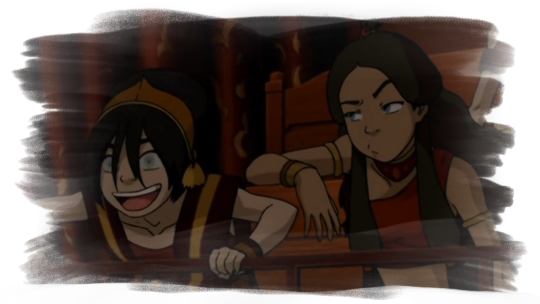
[ID: A shot from the same location as before, this time Toph has a huge smile on her face and is leaning on the balcony excitedly while Katara is leaning towards her, annoyed by her reaction. /End ID]
While it would have been better if Toph was actually listened to, it would have been…fine? if a justification was given for why they had to sit there (e.g. to avoid being recognised), if Katara had actually described the play for her. This wouldn't have been ideal, but it would have been better at least. In real life, many movies, TV shows (including this show's sequel series, The Legend of Korra) and other forms of visual media have an Audio Description track that does exactly that. If they weren't going to move for Toph to be able to see better, having Katara describe the play could have introduced kids to the fact this is an option. but instead it's brushed off, and I'll admit, it left a bit of a bad taste in my mouth, even back in 2006.
The Library is a bit more forgivable in my opinion, since Toph is still new to the group, but in this episode, she states that she doesn't want to go inside the spirit library because she isn't able to read and therefor there wouldn't be anything for her to do. However, it still would have been nice to see her friends consider this at all before they actually arrived. They could have (and should have) still gone, but some acknowledgement that they at least thought about the inclusion of their disabled friend would have been nice.

[ID: A shot of Aang, Katara, Sokka and another man are talking while looking down at a map on the table. Meanwhile, Toph is sitting on the other side of the table, completely disinterested as she sips from a large ice cup with her feet up on another chair. /End ID]
Alternatively, I do feel like Wan Shi Tong, a self-proclaimed all-knowing-spirit or his assistants would have been able to point her in the direction of something to interest her, since he does imply books aren't the only form of knowledge he collects.
The reason I mention this though is two-fold.
In real life, disabled people are very often left out of "fun" group activities, whether that be in formal settings or in casual ones, like hanging out with friends. If the episode had been framed as "the Gaang learns about the library and decides to track it down," I might have been less critical, but it's specifically framed as something that at least starts out as a kind of break for the team where they all take turns picking out fun things to do so they can rest, and Toph's access needs not being considered at all until they're already there hits a bit close to home, especially since they just end up leaving her outside. Secondly, there's also a stereotype that disabled people (and especially blind people) don't belong in academia and places of learning, such as in this case, libraries. This stereotype is about as old as the concept of organised institutions of learning, and definitely isn't unique to AtLA, but the assumption is often that disabled people wouldn't be interested in more formal methods of learning, so it's not worth accommodating us. With blind people in particular, when I've seen this in media, the premise is often "well I can't read anyway so why bother?" which Toph definitely falls into here with no push-back against the trope.
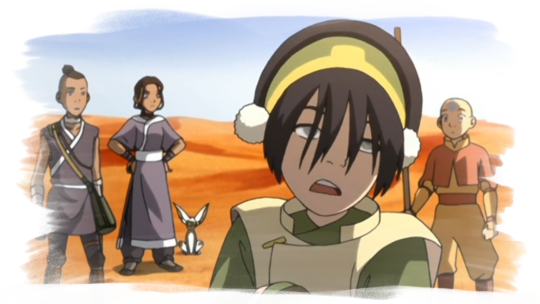
[ID: A close up of Toph and the rest of the group, Katara, Sokka and Aang standing in a desert. Toph shrugs, looking bored, while the others looks confused and surprised with the exception of Katara, who looks mildly annoyed, standing with her hands on her hips. /End ID]
It does make sense that she would have been resistant to going in, and I'm not saying this episode should have turned Toph into a bookwork akin to Wings of Fire's Starflight (another blind character) or anything. But there was a chance in this episode to push back against some of these assumptions, and I think it's a shame they missed it. How cool would it have been if Toph had mentioned not feeling welcomed in more formal learning spaces because of her disability, which was just reinforced by the way her old earthbending instructor and her parents treated her. She decides to go inside the library anyway as "backup" in case something goes wrong, grumbling about it the whole way down. Wan She Tong starts his introduction mostly the same way, saying humans aren't welcome and Toph makes a snarky comment about it. Wan She Tong, equally offended that this human thinks he, the all-knowing-spirit, wouldn't have considered something, shoots back with an annoyed comment about humans being so self-centred. He explains that spirits come in all shapes and sizes, and not all of them have eyes, but they can still access his library. She's not the first sightless being in his study, and he-who-knows-ten-thousand-things knows this too. Once everyone is permitted entry, one of the knowledge seekers shows her to a series of slates about a lost earthbending form that she can actually read (or at least, "see" the pictures on) because it's carved. Or instead of a slate, it's a series of statues outlining the form, similar to what Aang and Zuko find in the episode "The Firebending Masters". Perhaps this form is something that helps her develop metal bending later on, and lays the groundwork for Toph becoming interested in teaching in the comics.
And finally, Toph and Katara's segment of Tales of Ba Sing Se. Katara convinces Toph to go get a makeover with her as part of a girl's day. Overall, this segment of the episode is pretty nice, and I liked that they showed that a person's gender expression (in this case, being a tom-boy) doesn't mean they can't like things outside of what we usually associate with that. Tom-boys can like girly things on occasion, and vice-versa, and I think this is an example of an episode that would seem a bit ham-fisted today, but honestly, was needed in 2006. However, there's a throw away joke where Toph says "as long as they don't touch my feet," and it immediately cuts to show spa workers filing down the calluses on her feet in a way so painful several staff are required to hold her down.
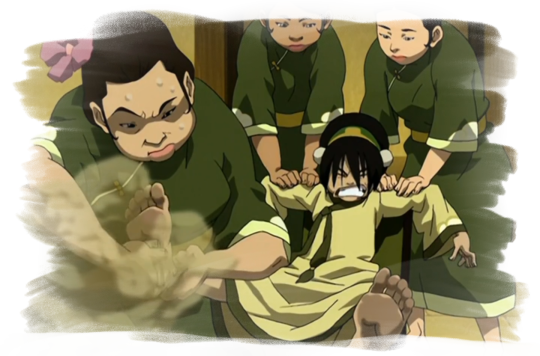
[ID: An image of Toph in a bath robe being held down in a chair by two spa workers while a third scrubs at her feet so hard that she is sweating. Meanwhile Toph is fighting against the two holding her down and has a facial expression like she is in a great deal of pain. /End ID]
this might be a minor thing in the grand scheme of the show, but it's still another example of Toph's boundaries about her disability and her access needs being disrespected by her friends, which the show just doesn't acknowledge it at all. People ignoring Toph's wishes about a part of her body she depends on in a much more direct way that others do is played off like a joke in a montage of otherwise enjoyable and goofy activities and this is a very, very common experience in disability circles.
There are a number of other, much more minor issues that show up with Toph as well, such as the fact she's the only one of the main cast who never has an on-screen (or on-page) relationship. not in the original show, not in any of the comics and not in The Legend of Korra. Again, it's not a big issue on it's own, especially because in AtLA, she's young enough where it's possible that she was just not interested yet, and she does have kids in The Legend of Korra where she mentions a relationship with a man named Kanto (Lin's father). So it is implied she does have some form of relationship eventually, but the issue is that it's never shown on screen or on the page. This feeds into a wider pattern in media of disabled characters being the only ones in their respective cast not given on-screen romantic relationships in stories, and so I still think it's worth pointing out, especially since the creators have had a lot of opportunities to correct that by now.
Toph is also portrayed, pretty much undeniably, as the best earthbener in a way that, at times, comes across almost like the creators felt like they need to compensate for her being on the team "despite" her being blind. This trope is one that I think Toph, at least partially, helped to popularise with the current generation of story tellers: The Disabled Savant. In this trope, disabled characters aren't really given the same room for growth as other characters; they aren't permitted to be average or still learning, they start good and get better. If they do progress, they often become the best, which is the case for Toph. To be fair, everyone in the The Gaang is the best at their respective skill by the end of the first series, which is why I say this is a minor point. She dose, however, have the least amount of on-screen growth in skill out of the whole team. Katara starts out barely able to lift any water at all, let alone actually bend it. Sokka is skilled with weapons from the start but does get his butt handed to him a number of times by others with more experience than him whom he learns from throughout his story arc. Zuko spends most of the early-to-middle of the show having things "blow up in his face" (to use his own words) and being belittled by his family of prodigies. While Aang is an airbending and, to a lesser extent, waterbending prodigy, he fails at pretty much everything else for a while before he starts to find his confidence - especially earth and firebending, not to mention the entire situation with locking himself out of the Avatar state. Toph is the only one who doesn't seem to fail or struggle all that much from a combat perspective. She does grow and improve in her bending (she invents metal bending after all) but she never has any moments where she really messes up or even struggles in combat all that much compared to the others.
All of these points and criticisms I've mentioned are not necessarily big in and of themselves, but when looked at together, they build up to create some issues with how Toph is depicted and how the people around her treat her disability
So that's it then? Toph is bad disability rep and Avatar should be "cancelled"?
God no. Like I said at the start, I still adore Toph and Avatar as a whole, but the show is a year away from being two decades old, it's bound to have some elements that don't hold up and I think it's worthwhile discussing them, specifically because I love the show and it's characters. Despite all the negativity I've brought up, I do think there are a lot of things AtLA did well with Toph too.
I've mentioned a few times that we rarely see how Toph's blindness impacts her life outside of her bending and combat abilities, and there's a reason I made that specification. Unsurprisingly, if you know much about the show's development, the ways in which Toph’s blindness and seismic sense impacts her bending and fighting style is one area where the show really does shine, and I still think that is worth a mention. The various types of bending are based on different styles of martial arts, specifically, different types of Kung Fu. Most earthbending in the show takes heavy inspiration specifically from Hung Ga, but Toph is different. Her bending heavily references Southern Praying Mantis Kung Fu, something unique to her within this world.
The reason for this (outside of simply wanting her to be visually distinct) was because the show’s creators made sure to consider what limitations Toph might have and what parts of the more common earthbending styles wouldn't work for her. Since her connection to the earth was critical in order for her seismic sense to work, they decided on a style that would keep her feet on the ground more, prioritised strong stances with minimal jumping and put more focus on attacking with her upper body. While not an intentional choice, the style they went with for Toph, according to the show's head martial arts consultant, Sifu Kisu, was supposedly developed by a blind woman in real life, at least according to legend. The creators also made further adjustments to the style with the help of martial arts consultants and just watching Toph fight is evident that a lot of love and care was put into the decisions made on that front.
I also appreciate that Toph's disability wasn't off-limits to joke about.
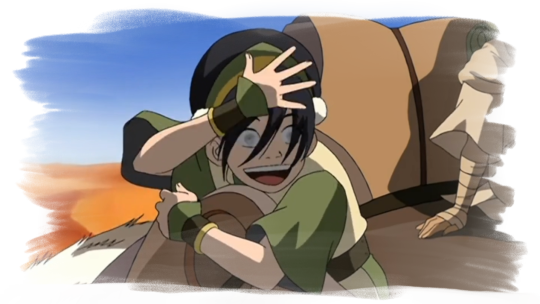
[ID: A picture of Toph waving her hand in front of her face with an exaggerated smile to remind the others she's blind. /End ID]
As I already mentioned, they didn't land 100% of the time, but lot of shows are afraid to use disability as a source of jokes, which would have felt weird and out of place in a show like Avatar. I see this hesitance in real-life too; people get extremely uncomfortable when I joke about my own disabilities and I've heard several people and even disabled comedians talk about the same observation. My last video on Tik Tok that got outside my usual audience was a joke about my prosthetic leg, and every single stictch and duet I received was people saying some variation of "I'm such a bad person for laughing!" "I'm going to hell!" or just straight up asking if they're aloud to laugh. If I didn't want you to laugh, I wouldn't have posted the joke! But joking about disability does make it more approachable.
Despite how often Toph and the others made blind jokes though, outside of the one instance I mentioned earlier, they never felt mean-spirited or like they were punching down. Even when a very sleep-deprived Katara was intentionally trying to be.
I think it's also worth keeping in mind the context of the media landscape when Avatar The Last Airbender was airing. Today, characters like Toph are very common, so much so there's a whole trope about them (super-crips) but at the time, having a character with a major disability be a main character in an action-orientated kids show like Avatar was really rare. She wasn't the first of course, but a lot of the time, if they were included, they were almost certainly sad and depressed, wishing for a cure or they were designated to the roles of "Guy in the chair" (which is a character, usually a tech person, who helps from the background), inspiration, scary villain fake-out (or other variations of "creepy" character) or the actual villain. Having a character that was not only comfortable in her skin as a disabled person, who didn't want or need to be "fixed" or "cured" to be directly involved in the story, and who's main obstacle (at least in season 2) were how the people around her treated her, was pretty ground-breaking at the time (pun not intended) and went against the most prevalent stereotypes of it's day.
And I really want to emphasise that. For many Millennials and older Gen Zers, myself included, Toph was the first character that didn't tell us we were broken and needed to be fixed in order to be part of the group (even if they slipped up with that messaging occasionally). Prior to seeing Avatar, I honestly thought there was something deeply wrong with me for being happy with my life (a reminder, I was 10 years old when this show first started airing), because every other disabled person in the media only ever talked about how much worse their life was because of their disability, how much they hated it and how much they hated themselves. Many outright said that they wished they had died rather than become like me. Toph wasn't the first to go against those tropes, but she was the first example of a disabled character who wasn't like that many people my age saw. Did she do it perfectly? Hell no, but personally, back then, I was happy to have a character who maybe over-corrected and took things a bit too far than another sad character talking about how lives like mine weren't worth living.
I also deeply appreciated that Toph did struggle with her independence, at least initially, and where to draw the line with accepting help. Because of how much she'd been coddled and overprotected as a little kid, she saw any attempt at people being helpful and working as a team as them trying to baby her. It was very on the nose, but I liked that the show gave her an episode just dedicated to realising that it's ok to accept help. Again, this is a bit of a story telling trope today, but having the disabled character realise that it's ok to accept help, and to do it without talking down to them or saying that them wanting independence was bad, was a refreshing change compared to what was around at the time.
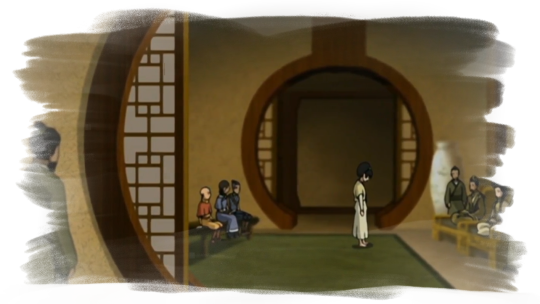
[ID: a zoomed out image of Toph, standing before her parents with Aang, Katara and Sokka standing behind her. /End ID]
While I think the show's creators could have benefited from consulting with disabled people and specifically blind people the same way they brought in consultants for the martial arts featured in the show, it's very clear to me that the intention behind Toph's character was good, and that actual effort was put in to make sure they depicted her well, even if some of it was a bit misplaced. It's also worth noting that the groundwork for a lot of my suggestions is already in place, they just didn't follow it all the way through.
Overall, I'd say Toph was good for her time, and she's what was needed in the 2000's, even if she doesn't hold up as well today. I also think it speaks to how far we've come in terms of disability representation. When I first started engaging with the online fandom directly, almost no one, even other disabled people, argued that Toph wasn't good representation, because honestly, the bar was on the floor and we were just happy to have something different. But now there are options, and the standards are higher, and that's so, so good. It means that people, even in the media, are starting to listen and be more thoughtful about their depictions of disability than we were in 2006.
And finally, I want to really quickly mention The Netflix adaptation of Avatar. A few people have asked me now what I think they should do with Toph when they get to her, and what my predictions about the show are. I'm not going to talk about my predictions here, because this post is already way too long and that's not what this is about, but I don't think the suggestions I made today would necessarily work in this particular remake, primarily because of the tonal differences. Some adjustments definitely could, such the other characters doing a better job at listening to Toph when she points out inaccessibility and them actually considering her in the first place, but others might be harder to balance. The original show could get quite dark and serious at times, but it was primarily a light-hearted adventure story for kids. From what I've seen of the live action remake though, they're more heavily leaning into those serious elements - for better or for worse, and as such, trying to tone Toph down in the specific ways I mentioned might not balance out as well as it would in the original show. At the very least, the specifics would need to be different. To be honest, I'm not entirely sure what approach they should take, that's not really the point of this post, but I did want to quickly address it to avoid confusion. My suggestions today were specifically on how to approach the cartoon version of Toph for a modern audience, and were not meant to be read as suggestions on how her live-action counterpart should be depicted.
#writing disability with cy cyborg#Wow I had a lot more to say about this than I thought (I think this is my longest post to date lol)#writing disability#disability representation#writeblr#writing#Avatar#avatar the last airbender#atla#Long Post#toph#toph beifong#the gaang#Animated Avatar#disability in media#fantasy
223 notes
·
View notes
Note
I can say as a demiromantic the Alastor shipping discourse just gets so fuckin tiring.
Like I hate it that the minute a character is confirmed to be ace, everyone and their mother immediately labels them as sex-repulsed and considers shipping said character a crime worthy of the death penalty. It’s not the “respect” they think it is. All this does is erase other identities on the asexual spectrum. All it does is allow misconceptions about asexuality to continue to be spread. All it does is push closet asexuals who may not feel sex-repulsion further deep into denial and in the closet.
I get being this defensive if, say, an irl celebrity came out as ace and expilictly stated to stop drawing porn and shipping them with people. But a fictional character? Really? Does the feelings of a god damn fictitious deer cannibal matter more to these people than an irl person? A person who could potentially just be trying to create a relatable rep for how they experience their asexuality?
I understand representation in the media is important. However, not everyone experiences things in the exact same way. Wether that be in how one experiences their gender, sexuality, disability, etc. That’s why VARIED representation is even more important. We’re not a hive mind. We’re people with our own thoughts and opinions. Our own experiences. And we deserve to be heard.
Now, while I don’t necessarily like most Alastor ships (nothing against them, just can’t see most of them happening) I’m not gonna burn someone at the stake for having a different opinion than I do. It’s not my problem.
Moral of the story: I just wish people would stop harassing others for having a different opinion then them
(Also personal HC of mine is that Al is Demi-Aroace but that’s just me lmao)
👏
#hazbin hotel#hazbin discourse#radioapple#appleradio#lucifer#alastor#radio apple#apple radio#nunalastor asks
272 notes
·
View notes
Note
I've noticed that you are interested in stories with multiple blind characters and often propose adding more blind characters to a story as a solution. I really struggle with this because it's not as simple as that -- stories don't have infinite narrative space. The idea that every story has a large cast is influenced by the prevalence of long serialized media in fandom: webcomics, TV shows, etc. But many writers (myself included) write a lot of novellas and short stories which often only have a few characters -- maybe even only 1 or 2! Even novels don't usually have huge expansive casts -- maybe 5 main characters with some additional side characters.
Considering this, I don't understand how it's realistic for every story (or even, say, 50% of stories) to have multiple blind characters (without it feeling forced). This is compounded by the fact that most blogs that talk about other forms of representation say the same! So if I write a 2-character short story and the protagonist is a blind Latino man, does the second character also have to be a blind Latino man? It just doesn't make sense! This is just a general problem I've noticed in discussions around representation -- there's an assumption that every cast will have 10+ characters and narrative space to develop those characters, even though that's not realistic for most narrative forms.
Do you have any thoughts on this?
Writing Multiple Blind Characters in Short Stories
Hi Anon! Surprise. I write short stories as well. I have experience with this. I have never felt like my blind characters were forced or unrealistic, even with having several of them in the same story. I’ll try to explain what might help you.
First, the idea that multiple blind characters is forced or unrealistic comes from ableism. Think about why you feel there is a limit on disabled characters. If you can create stories, I would hope you are creative enough to consider the possibility that multiple blind characters could exist in the same place and time. Challenging this barrier opens up more possibilities, allowing you to explore different types of blindness, different reactions to it, different upbringings, and multiple ways of living, adapting, and navigating being blind.
Second, blind characters need access to their own community. This is where they learn how to be blind. This where they get support. This is where they might find understanding and belonging. You can find more information about community here in an excellent reblog. Also, here.
As you mentioned, I often suggest adding more blind characters when writers insist upon using stereotyped portrayals. Having multiple characters with different experiences helps to make your story more realistic and nuanced, contrary to what people might implicitly believe. Having more than one blind character is something I highly recommend because it helps with not having all your representation rest on the shoulders of one character.
For example, if you are worried a main character who has cloudy eyes might reinforce the idea that all blind people have cloudy eyes, having another blind character with a different experience may help. If one of your blind characters is naive and innocent, you might have another blind character who is brash, displays a lack of trust in others, and has a lot of shocking stories. Maybe they’re in a rock band together. They met while playing blind football (aka soccer) on a middle school team. They bonded over their pet cats and sour patch kids.
Or something.
Another important thing to remember when writing is that you have control over the story. Too many writers come to me feeling stuck because they feel they cannot change their story while also wanting to incorporate my suggestions. This makes it challenging to address implicit bias or stereotypes, much less guide writers in going in different directions.
Additionally, I feel uncomfortable with the complaints about other blogs in this ask. I feel like this isn’t really about me, nor is it something I can comment on. I will say that it sounds as if a bunch of blogs dedicated to helping people write marginalized characters are mentioning some of the same things. They are probably doing so for a reason.
However, while it helps, writing multiple blind characters won’t improve every story, which I explained in my review of the book Blind. I was not impressed with this book. I did not feel that the four blind characters were very good, nor did having them help with offsetting the portrayal of blindness as a miserable experience.
Conversely, one of my favorite blind characters is Toph Beifong from Avatar: The Last Airbender. Despite being the only blind character in the show, the writers did a good job with her. Would I have liked her to meet more of her community as she travels with the Gang? Absolutely. Even though I like her, she still never had access to her community after being isolated by her parents for so long.
So, no, you don’t need to have multiple blind characters if the suggestion bothers you this much. I even provided good examples of what to do, what not to do, and times where my typical advice was not as helpful for the resulting story.
However, please consider where these feelings stem from. Consider the origins of the idea that having multiple blind characters is unrealistic. Using the example you provided in your question, I wonder, would you say the same if both your characters were white and abled? Is there any way you can challenge the fear of seeming unrealistic? What about being considered unrealistic bothers you so much?
You don’t necessarily need to have characters in the story for them to exist. Even background characters can help. I will try to give some ideas for this:
Does your blind character have family they can talk about or remember? Are any of their family members blind?
Do they have any friends? Just because the friends aren’t in the story doesn’t mean they don’t exist at all.
Does the blind character have any formative memories or flashbacks?
Does the character who isn’t blind know any blind folks?
Your characters should have lives outside of the story. They should have memories and experiences that made them who they are. This is where you can have other blind characters. Perhaps this is how your blind character can have a community.
However, I would still like to see more blind characters interacting with each other. This is what I want as a blind person. If you don’t want to go that direction, that’s fine.
I hope this helps.
#blind#blind characters#writing blind characters#ask#scheduled post#writing more than one blind character#multiple blind characters#ableism#let blind people have friends and community challenge
198 notes
·
View notes
Note
What do u say about these supposed hard core fans that are shipping buck Tommy? They gonna make the writers keep that homophobe around 😰
I am entirely the wrong person to ask about this.
Firstly, I ship Bucktommy AND Buddie. And this is possible! You are allowed to see Buck be happy with a man for the first time (how fucking good!!) but also wish upon the nearest star that he ends up with Eddie in the end. I truly believe Buddie is endgame but at the moment, I am more delighted at the fact that Buck is happy, with a man, experiencing a positive queer relationship.
The reason I ship Bucktommy is because look! at! how! happy! this! boy! is!!! I will ship ANY person that makes my little blorbo as happy and blushy and giggly as Evan Buckley is when he's with Tommy Kinard. He is SMITTEN. Do I think they're endgame? Not at the moment, no. Would I be upset if they were? I'd mourn the fuck out of Buddie, but I would be glad that Buck is finally happy and comfortable in a relationship. His happiness is paramount.
For the reasons why Buck's bisexual arc is more important than a ship, please read this post. It talks about the importance of representation in current media, and my own experiences of coming to terms with my bisexuality just before this arc was aired. What we're seeing with Buck's story is revolutionary, really. We haven't seen this kind of thing happen in media much at all and it is so important to show.
For any issues regarding Tommy, please read this post by the lovely @slightlyobsessedwitheverything. They beautifully go through all his appearances and break them down for us and I would urge you to read it with an open mind.
Now, about Eddie. I am an Eddie girlie (gn) through and through. That is my babygirl and I adore him with every fibre of my being. I would love nothing more than to see him go through a queer arc. However, right now, Eddie is not in the place to do so. We saw from the last episode that he's an untapped reservoir of Catholic guilt, and it's gonna take a lot to work through that, before he can have any kind of realisation re: Buck. He's very much in his comphet days but is starting to take some steps towards undoing some of his old habits, like getting Marisol to move out when he realises they're moving too fast.
With this in mind, I think it would be too rushed and too early for Buddie to get together right now. Yeah they've had many seasons of being married and living out of one another's pockets but given the stages of life they are both in, I feel it wouldn't end as well as we'd like it to. Eddie isn't in the right place for it. Buck is exploring his sexuality. They need time to learn and grow and do some serious thinking and realising before they can even begin to contemplate a relationship together.
Regarding the "homophobe", I am assuming this is referring to Edy Ganem and not Lou Ferrigno Jr. I would like it noted for the record that I cannot stand Edy and therefore cannot stand Marisol. If Meddie were to be endgame, I'd fume. They have no chemistry. They do not suit one another. And I don't believe Edy should be given a platform to spread her hateful rhetoric, and I hope the last we see of her is 7x07. I'm a little mad it wasn't 7x05 but there we go.
However, Tommy and Buck's storyline and Eddie and Marisol's storyline are entirely separate. The only thing that links them are Buck and Eddie, and their friendship. I don't believe that Tommy's existence means Marisol is going to stick around and I find it a little odd that you do. Buck can and has had relationships that aren't Eddie. Eddie can and has had relationships that aren't Buck. Buck being in a relationship does not mean Eddie will also be in one. Tommy's existence does not confirm Marisol's continued existence.
My current best case scenario is Eddie being single by the end of 7x07 (please god), and Buck and Tommy continuing their relationship, so Buck has the opportunity to learn and experience same-sex relationships while Eddie has the time to deconstruct his true feelings, get therapy, work through 30+ years of repression, and then they'll be ready.
ALSO I DO NOT WANT BUCK TO CHEAT ON TOMMY WITH EDDIE. WE ARE NOT HERE FOR THAT.
Best case scenario, sometime towards the end of s7 or beginning of s8, Buck and Tommy decide that they both want different things out of life, have an amicable split that doesn't leave either of them hurt, Tommy sticks around as a recurring character because he's ingrained in the 118 again, Eddie's doing his therapy thing and then maybe mid s8 him and Buck can start coming to some realisations with a potential for Buddie moments towards the end of s8. Honestly anything else would seem too rushed.
The final point I'd like to make is that I find it extremely odd that you call people who ship Bucktommy "supposed hardcore fans". Shipping anything other than Buddie doesn't make you any less of a fan. Actually, I'd argue it shows a bit more commitment to the characters as you're willing to be open to them growing as humans and expanding on the personalities that we love. If Buddie is the only reason you watch the show, I feel you should re-evaluate your motivation. This show has so many great ships, such as Bathena, Henren and Madney, as well as Buddie and Bucktommy, and considering this is an ensemble show, we should show all of them as much love as the other. These characters are so intertwined with one another and that's what makes this show so worth watching. Watching for 2 characters and 2 characters only is not getting the full enjoyment out of it.
I hope this answered your questions and gave you something to reflect on. As I say, I'm not the right person to ask about this as I too ship Bucktommy, currently have 2 Bucktommy fics in my drafts and watch them kiss at least 10 times a day. And for future reference, I will be unfollowing/blocking people who throw tantrums about not getting Buddie so far, or who believe you can only ship Buddie and feel superior for doing so. Have a good rest of your day.
#james answers things#james says things#bucktommy#buddie#evan buckley#eddie diaz#tommy kinard#fandom discourse I guess?#911 abc#911 season 7#911 buddie#911 spoilers#anon#asks#this ended up a lot longer than I thought it would#but this question pissed me off a little dskjdsk#thank you for coming to my TED talk
131 notes
·
View notes
Text
Thinking about the Don Suave scene and what it means in terms of LGBTQ+ representation because my brain does nothing if not torment me with random topics to ramble about on the regular.
Anyway, I just wanted to ramble about why I like the scene but to get it out of the way - the scene can very easily be interpreted in so many different ways, and all of them are valid. I personally see it as Leo having at least some attraction to a man. And the following is an explanation of my own interpretation and thoughts on it and what it means especially for Leo’s portrayal in the grand scheme of things.
Long-winded interpretation under the cut!
Now, to start with, it’s important to me that in the scene Leo looks at Don Suave in the very beginning and then for the entirety of the rest of the time the man is on screen, Leo’s eyes are closed. Yet, in the end, he is still visibly enamored with Don Suave, happily cuddling up to him as he’s being carried away.
You can very easily interpret this as Leo being spellbound and that’s honestly super valid and I believe he likely was at least somewhat in the beginning, but considering how fast he looked away and how he never looked again, I personally think it makes more sense to read it as Leo just finding the man attractive, at least somewhat. (For the record, I personally headcanon Rise Leo as bisexual with a heavy preference for men, but I want to be blunt when I say that any interpretation is valid. Literally any. Ace, pan, gay, bi, none of the above or a mixture of something new literally all of it is more than okay and fair. Hell you could even interpret this entire scene as more romantic attraction than physical and it would still work. Anything goes!! Don’t bother people, guys, really.)
The main reason I take this scene to be at the very least LGBTQ+ adjacent isn’t just because of how it’s portrayed, but because of who Leonardo is. Not in terms of Rise of the TMNT, but in terms of the entire Teenage Mutant Ninja Turtles™️ franchise.
Leo’s a character who, while changing with each iteration, has still at his core been around for decades upon decades as “the blue one”. One fourth of the team. He’s the one most are going to look at as the Leader, and oftentimes he is the one closest to having the title of Main Character. Not to say the others aren’t just as important, but Leo’s presence in the A plots of basically all TMNT media is often something very main character-esque.
And that’s very, very important to note. Here we have a Main Character of a prolific and decades long-running franchise distributed by a children’s television network. You can play around with his and his brothers’ characters all you like, but there is always going to be challenges to dodge around, especially since this was still in 2018-2019.
For example, you can play around with their designs so long as they’re color coded turtles, but their sexualities? Now that’s tricky.
“But what about Hypno and Warren?” Not main characters and also they’re Rise originals. They have a lot more room to play around with than a character like Leo does. But even talking about main characters in the franchise, you could arguably have an easier time playing around with Donnie or Mikey’s sexualities than Leo or even Raph, as (unfortunately) the former two tend to get more B plots, so they’d likely have had a little more leeway (still not a lot though.)
So, where does this leave us?
It leaves us in a place where outright stating and/or showing undeniable proof of Leo’s attraction to men is very, very difficult. So, workarounds!
Workarounds like the entire Don Suave situation.
To be honest, as left up to interpretation and lowkey and deniable as it is, this whole scene means a lot to me because of who Leo is as a character. It’s just nice when we get so see even the bare bones of representation with characters that have been such a large part of pop culture for decades, y’know? Even if more would be so much nicer, this is better than I thought we’d ever get for these boys.
And, again, literally nothing I’ve said is the only way to interpret it, I’m more than happy when people interpret media on their own honestly, it’s just something I’ve been thinking of lately and I was wondering if others felt the same way.
Whatever you think when you interpret this scene or Rise Leo as a whole, I just thought this would be interesting to think about, even if it was ramble-y, haha.
#rottmnt#rise of the teenage mutant ninja turtles#rottmnt headcanons#rottmnt leo#rise leo#rise don suave#rottmnt don suave#I lied I’m back to ramble because I’m just#so bad at keeping my mouth shut#or uh#not typing word vomit#anyway- yeah this is my personal interpretation#I believe Leo was legitimately mesmerized by Don Suave’s powers…in the beginning#but even the series’ creator says it was ‘at least PART of what was going on with Leo’ so#idk it’s something that’s been on my mind and I was wondering if anyone else felt the same??#may delete this later who knowssss#pleaaaase feel free to disagree I just like to talk lol#but yeah sometimes I look around at how much media has LGBTQ+ rep in it now and it honestly makes me emotional??#(we always always ALWAYS could use more but)#we did not have even a crumb of this as kids#but also like most of that rep is new properties#and I just was thinking about what that could mean#idk man idk#once again please don’t take this as facts it is VERY MUCH NOT#man I was looking around for good images to use and found jack all#anyway tho did you know Donnie often has bi colors around him and Leo is often dressed in the colors of the trans flag-#okay anyway back to the caves I go this comic won’t draw itself#I gotta spray myself with water any time I go to type long winded essays because they’re not great for the mental health fr
117 notes
·
View notes
Text
I have a physical reaction every time i think about the queercoding of Dave at the end of homestuck. My roommate and I were reading it and i kept having to take a moment to think “holy shit, is he coming out??? is that what we missed on the meteor round 2?”. I don’t keep up with Andrew Hussie news bc i don’t really like him as a person, but the whole talk with Egbert on the lillypad makes me think Hussie either was really close to a queer person or queer himself with just how accurately he wrote Dave talking about the queer experience, even if he doesn’t actually come out in that part. It doesn’t feel like queerbaiting either bc it bc fits with Dave’s characterization and how hard it is for him to talk about anything sincerely.
I don’t want to downplay the importance of Dave realizing the thoughts Bro instilled in him about how a man should act in favor of speculating about his sexuality tho. Not wanting to be a stoic hero of man who doesn’t have attachments or be soft with anyone is a huge part of Dave’s characterization and character arc. I think they go hand in hand tho, his struggles with toxic masculinity and his sexuality. I think the conversation was blatantly about both while Dave gave himself an out to pretend it was just about one. And he didn’t even do that.
I’m about to get hella pretentious and read way too much into things under the cut. More rambling about Dave’s character arc as a whole and nitpicking of dialogue towards the end of homestuck down below.
Future peepaw edit: this turned into a fucking play by play essay, my bad
Out of order but I also want to talk about his characterization as a whole.
Homestuck Mobile formatting jumpscare:
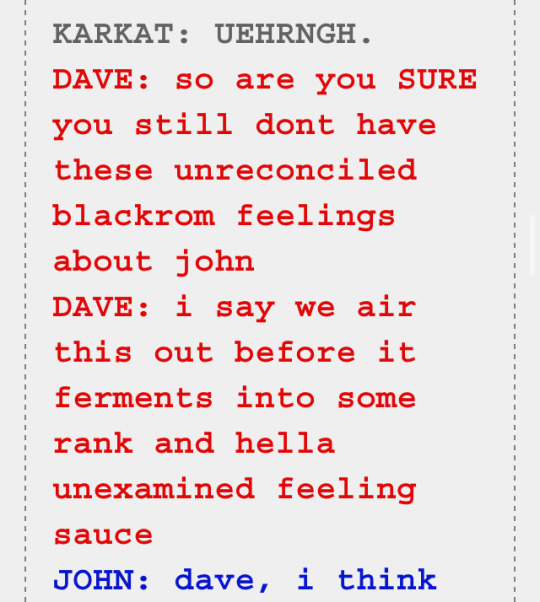
He’s willing to talk about another guy’s feelings. Romantic ones. for someone at the time presents as a guy. It doesn’t even feel like he’s joking. 13 year old Dave would never.
And this happens before all the stuff i mentioned earlier, showing exactly what he talked about. I honestly don’t think any other character has an arc like Dave’s. Which, seeing as Dave is a fully fleshed out complex character that makes sense, but I mean in general. I have consumed a lot of media, i’ve consumed a lot of queer media too. I’m really into the history of queercoding and how it relates to representation. I don’t think I’ve seen a character arc quite like Dave’s, especially in relation to sexuality and toxic masculinity.
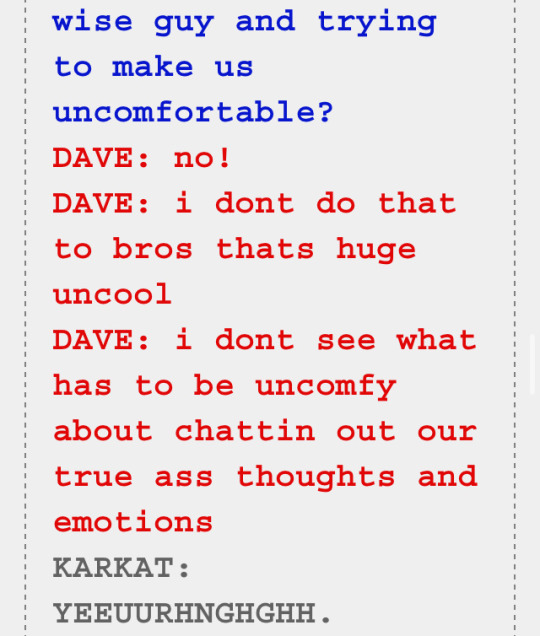
Egbert assumes that Dave’s being a dick on purpose, and Dave rebukes it so strongly he uses an exclamation point. In a series where how people type is kind of a big thing, Dave’s frequent lack of punctuation is a nod to his “cool guy” facade, the lack of tone indication part of the “mystery” a cool guy has to be surrounded with. So, the fact that he feels strongly enough, or has loosened up enough on the cool guy show no emotions routine speaks to his self reflection. Of course this is stated literally a few more dialogue lines down, about how much time he spent on the meteor thinking about societal norms and his Bro’s teachings but the fact that it’s sprinkled in before hand too makes it feel less like it’s come out of the blue, or that it’s out of character.
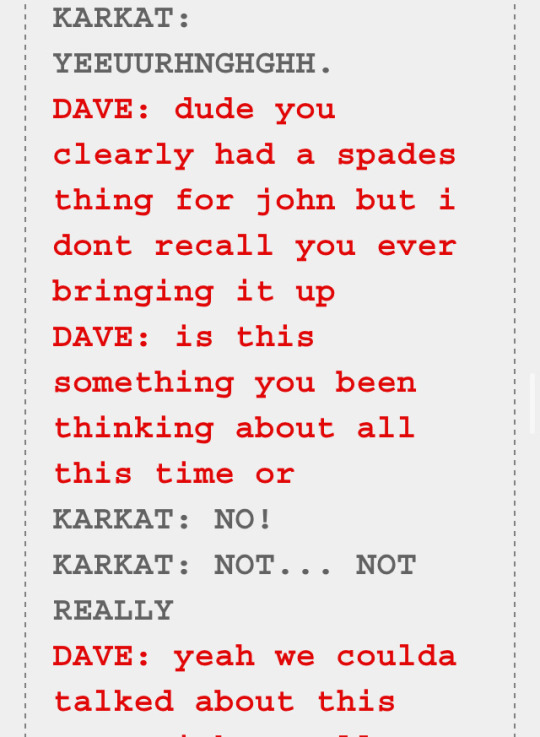
“yeah we coulda talked about this” says so much. Not only to his relationship with Karkat (romantic or not, i’m a Davekat shipper but that’s not what i’m getting at here) but just how far he’s come with getting close to others. Not to mention the fact that it’s implied that they talk at least somewhat frequently about heavy and deep issues such as feelings for other people definitely feels like a major shift in Dave’s character, one for the better.
He’s probably been vulnerable with Karkat in a way that he never was with anyone as a kid. They talk about things. They talk about important enough things that Karkat’s past black crush on Egbert never coming up probably feels a little strange, hence Dave asking if he’s been thinking about it all this time. He has that connection with Karkat, which is important bc Karkat is masculine presenting. I’d bet money that Bro would not have approved, regardless of them just being friends or not.
That level of vulnerability? Not immediately calling Karkat gay and dunking on him? Treating what would be seen a gay relationship as completely normal and not even something to bat an eye at? 13 year old Dave WISHES he had the emotional maturity Dave has now.
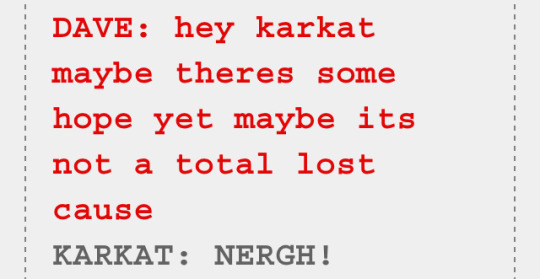
He even encourages Karkat to hold on to those feelings bc Egbert expressed that they could hate people, at least platonically. Egbert even calls him out, saying he sounds like he’s being a dick about it and Dave says he’s being real.
Not to mention he kind of forgets that Egbert “isn’t a homosexual” at this point, that or he suspects Egbert isn’t straight in some capacity. I think he has less hang ups about queerness than Karkat does at this point. Or at least less hang ups about being honest. It feels fitting for his character and i’m sad that most of that character arc is off screen. I get it tho, writing meteorstuck round 2 would have made homestuck significantly longer most likely.
In conclusion: I like Dave and his character arc too damn much. I have to go to work now, i was not expecting to have this many thoughts about it and i’ve rambled enough.
#homestuck#dave strider#does this count as#character study#karkat vantas#john egbert#june egbert#i’m vague on pronouns for Egbert#peepaw story time
61 notes
·
View notes
Note
Hi Bones!! Thank you for you hard work on this project and for sharing it with us!
I've seen your posts about weird representation of society (regarding the "natural order of things") in xenofiction, especially in lion king, so I wanted to ask:
could you recommend any xenofiction media that has all (or most of the) animal species sapient? Or is the only solution to make just one or two species sapient while the others (especially prey) are plain animals?
Really sorry if you've seen this ask from me before - my account had a weird laggy period when I couldn't send or receive messages and asks, so I don't know if you got the previous one! I just know that now it's fixed so I double all the asks sent haha
Honestly I'm not totally sure! If any 3rd person has some good recommendations for "every being is alive" xenofiction types, feel free to weigh in.
If you want to jump in with me though, I am following the webcomic Africa. It updates every Wednesday. Africa is about a mother Leopard on the verge of a great ecological disaster, the relationship between her children and the animals around her, and the strength of both instinct and choice as the characters face an uncertain future.
Since it's ongoing, I still don't know how it's going to end and can't judge it as a full work! But it's absolutely fascinating and I think the author is doing a fantastic job so far. Bonus points for the way it portrays humans, btw.
No more spoilers though, if you're interested, it's on Webtoons.
(I'm also planning to read Oren's Forge soon. Ask me about it again in a few months over on Bonebabbles and I'll give you my thoughts)
As an aside though, funny you mention it because like... ever since I was a kid I've had a story I want to tell with the premise. It's a scintilla I've kept close to me for well over a decade but haven't done anything official with. So this is actually a theme I've thought about a lot.
It's rare to see it done well though because like... its very premise butts heads with reality. The "natural order" that an animal follows is not something it moralizes. A tiger doesn't have the capacity to think about how fucked up it is to kill to stay alive, the deer doesn't know that if its population isn't controlled it will destroy the forest.
They're animals. They don't HAVE that agency. Your dog does not care about being sterilized. A snake doesn't differentiate between a pinky and an adult mouse except in terms of if it will fit in its mouth. But the minute you put human morality in there... they have the ability to reason, create and agree on the rules of a society, make choices about MORALITY.
If nothing is going to change about their world, you just end up putting human arguments about "natural order" in their mouths and, well... start telling a parable justifying this "natural order."
(Genuine) Does what I'm saying make sense? Animals DON'T rationalize or negotiate. HUMANS do.
So the minute you're approaching a world with that logic, like it or not, you are invoking those "arguments from nature." And you're putting them in a being that is not fully an animal or a human, but an anthropomorphic mix which CAN rationalize but WON'T make an effort to change their world.
(Which is why tbh the best examples i know of are works with a theme of "change.")
OH WAIT I also remember another that's interesting!! Leafy: Hen into the Wild actually has a fascinating take on it. It's not interested in "moralizing" or really being about an animal society. It's a very emotional sort of movie, and it's about joys in adversity, the freedom that choice gives you, how bad things are going to happen and you can never completely prevent them.
INTENSE movie emotionally, the ending will wreck you (especially in the English translation which leaves out a really important theme making it feel abrupt x_x) but it's really good. Check that one out.
OH and also You Are Umasou. That one has more pitfalls imo (it does try to moralize a bit) but it's super unique as a movie. And is about dinosaurs.
#Don't take my opinions as gospel tho#There's no ONE RIGHT WAY to tell a story or handle a theme#And every person can have a unique reading of any story#Some stories can even be interpreted super differently by going in with different readings#Media isn't a box you take the lid off of to loot for objectively correct objects#It's more like eating a meal#Examining ingredients/tropes and how they were used#Trying to identify what the author set out to do and if it accomplished it in its current form#And sometimes idk chicken noodle tastes like hot saltwater in one moment but then hits different 2 months later when surrounding--#--circumstances (like being sick or cold) make it hit different#Point im getting at is that we could objectively say 'they used chicken and noodle' in this dish#But analysis and opinions and expressing them are an art of their own#Bone babble#Anyway prolly gonna be quiet the rest of the day so I can do clanmew prep lads#Media analysis#Xenofiction
76 notes
·
View notes
Text
Plastic Women: So, what is my point?
A note for those who somehow would like to hear more from me about the video
The mega video started out as a final essay assignment for a children's media college class. The prompt was ten pages on a topic related to children's media that tied into one of our weekly discussions. Being as obsessed with ninjago as I am, I was obviously going to write about it, and one of our weekly topics had to do with children's media's relationship to gender. I had a lot of thoughts on the female characters of the show, so I decided this essay would be a good opportunity to get those off my chest. Plastic Women: Female Representation in Lego Ninjago was the end result. It was a good essay- maybe I'll post it some time. The only problem was that my initial first draft was nearly a dozen pages long- and I had only just finished my thoughts on Nya. I decided that a paper analyzing the arc of the central female character would be perfectly adequate for the assignment, tightened things up a bit, and submitted it. I knew as soon as I did that the rest of my thoughts would have to come out- and that's what the four hours you've(presumably) watched is.
Being that the original point of the essay was to fulfill an assignment requirement, pinpointing the end goal of the video was a weirdly difficult struggle in the production process. I knew I had a lot of thoughts about the women, I knew it felt important that they get out into the world, but I couldn't quite put my finger on why. Why is this so important? What's my point in making this? Why do I have this drive behind things? I offer up a couple explanations in my video. Part of it was to help improve consciousness of these issues, to stress that female representation is actually important in male targeted media. To help encourage better practices for the show's future, to get people think analytically about the media they consume. These explanations seemed to satisfy me, and I still think they're all very important and valid, but even as I sat down to record the outro, there was this nagging feeling that I hadn't quite gotten to the core of why I was making this. What was driving me to put in a year and a half of effort, scripting, refilms, and endless, endless editing in order to get this out? Because while I do care about all of those things, it doesn't ignite that same passion source of where this video is coming from.
Unfortunately, the realization only really hit me after posting the video- after reading the comments. Unfortunately, the negative ones. I don't want to overstate how much hate the video has gotten, it has been widely well received, but I have my fair share of suspected (or self described) children and pre teens calling me an idiot for overthinking things in the comments. Some of these are obviously only responding to the title and thumbnail, and it's quite fun to scroll through the comment section and point them out. But of the people who have the most plausible deniability for actually watching at least part of the video, the most common criticism was by far the run time. Why am I dedicating this much time to a show which is obviously not a raging hate letter towards women? I'm labeling this thing as sexist when there's a whole season of the lead female fighting sexism. There are so many worse things that might deserve this run time, but ninjago can not be that bad. This is obviously ridiculous.
Now there are a couple of responses I have to this sentiment. First of all, the series is insanely long. I have to not only analyze, but explain all 15 seasons for those who (understandably) haven't watched it all or aren't as obsessive as I am. That's gonna take some time regardless of what angle you're doing a deep dive on. Have you seen the length of some of the show recap videos alone? Second, the video as a whole is a retrospective, not purely a criticism. I spend quite a bit of the run time praising the things which I do like and shrugging at things I think are passable. Third, I state up front that I am purposely looking for all interpretations of the text, because they are all interpretations that a young audience could potentially take away. Even if it's not surface level, if it's one or two layers down, I'm still interested. That means it's not logical to blanketly call the show sexist, because it's not openly promoting these ideas, and that was never my goal, I think I made that clear. In many ways I believe that if this were a "Ninjago is sexist" video it would be a lot shorter. Part of why the runtime is so long is because there is a great deal of nuance to how this show treats its female characters, and nuance takes time. If it were as simple as "Ninjago is obviously misogynistic" I would point to the problem spots and we wouldn't need a discussion. I wouldn't have to analyze. It would just be a statement of fact. But that's why the video's title is much less specific and accusatory. "More misogynistic than you remember" is a lot more open ended. It has some misogyny in there, and it's more than your child brain likely noticed. That doesn't mean it's necessarily overwhelming or defining for the series, it just means that it's there- and that amount is going to differ depending on the viewer and their personal interpretations of the text. I for one thought that the Racer 7 plot line was an obvious dismissal of female struggle, but apparently it's not as clear a universal a reading as I thought. Maybe it's my life experience as a women in a male dominated field that put that front and center under a undeniable spotlight for me, but that doesn't mean that's the universal experience of the show, nor should it count against the show so strongly as I feel it.
But this criticism is finally what made it click for me. I'm not criticizing the show because it's obviously sexist. Quite the opposite. I'm criticizing it because it is trying to not be sexist. I'm criticizing the show because it wants to be progressive, it's trying to include female characters, it is including messages and plotlines specifically to try and uplift women- and it's failing.
I am past the point of feeling the need to point out that andrew tate is wrong for seeing women as lesser. That's not an interesting take, that's not a new idea, and if you need that told to you, you are likely beyond help from a youtube video. I am not here to dabate if female representation is valuable, I am taking that fact as a given because it is a conclusion which I feel is inherently correct. If you have not yet come to this same conclusion, the purpose of this video is not to convince you that it is. That can be someone else's job. This is not a 101 class, it's got some prerequisites, because without them, you aren't going to appreciate my points. I am interested in giving ideas to people who already know their basics. It's not my fault if you're a few decades behind in your ideas on film theory. The efficacy of what constitutes positive female representation has already been debated and outlined for decades by people much smarter than me. I am not here to make their points, I am here to make my own.
I'm not here to point out the problems of blatant sexism, because that has been litigated to death; I'm interested in the problems of sexism today- because yes, even when sexism isn't blatant, it's still a problem. I am interested in breaking down subtle sexism. Accidental sexism. Systemic sexism. Sexism from people who are trying to be inclusive, because they are the ones who will actually take feedback. The sexism that is baked into our media culture, so deeply ingrained that it seems rather acceptable to show sexual assault on a kid's show. I am interested in why a show which so obviously repeatedly tries to incorporate feminist ideas into its plot can so easily rid its female characters of agency. It's not that I made the video to say something about ninjago, it's that I made the video to say something about sexism in media, and used ninjago as my example. It. Is. Everywhere. And perhaps even worse, it is ridiculously easy to accidentally end up in your work.
I do hint at these ideas throughout the run of my video, but I really wish I had known this was where my drive was coming from at the outset, because if I had, this idea would be pressed constantly. Tropes older than the film medium seep into the most basic of plots and position females in passive roles by default, and if you don't know that, you are going to ingrain these ideas into your work. It might not be blatant, it might be quite subtle, but it may also snowball into something egregious, like happens in skybound. It was supposed to be a season (partially)about fighting sexism, but ends up framing our lead female as an object, removing all her agency, and turning our leading man into an extremely objectifying character who never grows out of his possessive behaviors. Like I say at the beginning, this is a cautionary tale. It's active proof that doing the bare minimum in not being offensive in female representation requires an amount of effort that many people don't realize is necessary. It is almost never that the show outright says something sexist, it's that the plot structure and character progression do not think to include its female characters. It is not the text, it's the subtext. And you might not think that subtext is influential, but the very fact that you think it's not is the most terrifying thing about it. Our brains absorb so much more than we know, and the fact that these patterns and stereotypes are seeping in subconsciously without our recognizing it, is perhaps even more dangerous than outwardly sexist media in some cases. Consistency in these patterns is bound to rewire your brain- and you won't even notice.
That's the point I think I failed to emphasize throughout the run. How easy it is. How ridiculously easy it is to fall into these problems. "it's like you see sexism everywhere!" well, yes. It is everywhere. That's the point. It's baked into our culture. It's a corner stone in our media. It's systemic. That's the problem- that it's near impossible to find something that doesn't have it because it's a founding principle of most of human culture. That's why reverse sexism is not nearly as big a deal btw. Sure, shows aimed at little girls have a lot of underdeveloped male love interests, but they also haven't been stuck in that position for centuries upon centuries of human storytelling.
I don't feel the need to prove that the label of misogynist or sexist is befitting of the whole series, because for one, it's not, and for two, that wouldn't do anything. Ninjago is a symptom of the problem. It is not the problem in and of itself. Blacklisting it for being bad doesn't help anything, and I think I made it abundantly clear that was never my intention or desire. My intention was to show you just how prevalent this casual sexism can be. How this subtle (and sometimes not so subtle) undercurrent can be found in something as unexpected as a children's show which actively brags about the strength of its female characters. The goal was to open your eyes to how consistent it is, even if it's not potent. It was to lay out how the patterns tend to present themselves, so that maybe you'll be able to better identify them elsewhere. Because they are elsewhere. They're everywhere. It may not be in as high a dosage as it used to, but collectively it is still a staggering, saturating amount. And if you are an artist looking to make something that doesn't have this subtext, I'm here to warn you that it is likely a steeper up hill battle than you initially presume.
Misogyny is everywhere. I just happen to know a lot about ninjago, so that's where I chose to go in depth in breaking it down. It's a case study- and I think a quite interesting one with a lot of nuance at that. It's what I felt I could contribute, and I have to believe that's enough to justify its existence.
54 notes
·
View notes
Text
I might go a bit silent for some time after this post because I've been neglecting my real life lately in a way that's seriously about to bite my arse, but. I'm here to say something that I fervently wish the 9-1-1 fandom, and the queer audiences, or fans of queer fiction in general... will hear and embrace. It's this:
This is the time to let your freak flag fly!!!!
Don't you DARE hold yourself back!!!
Let that freak flag fly!!!
I say that because we need that enthusiasm for our survival. We need that enthusiasm NOW.
Who is this we? It's us!! Fans of the show. Fans of queer fiction. Queers! Allies! People who believe in love! Queer representation in media!!
Because do you even realize what this show just did when it gave us a canonized bisexual Buck, kissing a man on screen, for the first time, in season 7 of the show?
No, it wasn't fan service. It wasn't the show folding to an obsessive queer audience.
No, this was planned, from the very beginning. Anyone who pays any attention and watches the show with open eyes can see it was.
They wanted to create a closeted bisexual character who would stay in the closet for a good while. And they did.
Yes, I am being 100% serious, yes, I absolutely believe this to be true.
These characters we follow, these storylines we watch... Do you really think these characters are just the result of random keysmashing, the writers just going
"Hmm I don't really have a plan here, let's just call this guy "Buck" and release him into the world! ... What do you mean, who is he?
I don't fucking know, he's Buck, let's just decide what to do with him later! I'm going to lunch now, who's coming with me?"
No. These characters are designed. They are planned. They are crafted out by teams of writers, who brainstorm and discuss, and pitch plans, and figure them out:
Which quirk makes them interesting, what secret are they hiding, what are their flaws, what's their backstory, why do they behave like they do...
What to do with them, what kind of story to build with them, whom to match them with for future romances... And so on.
The end result is thought out, because they want the characters to be complex, and human... yet consistent...
And to serve a purpose: to help the storytellers create meaningful stories, and illuminate important issues.
And this character design process nowadays? It definitely includes figuring out what the character's sexuality is - way before you release them into the world!!!
Because the writers know they need to know, and understand the character, to operate them in a way that makes sense, and sexuality is an important part of the "design".
Because that's how you ensure consistent behavior, how you establish a personality!!! I'm being serious, this is just basic characterization, and worldbuilding, and these writers are professionals.
Sexuality is a trait that real people are fairly consistent about, and good fiction imitates real life. For example... If my dad just out of the blue got busy with another man, I would be quite stunned because I've spotted no signs that he might be closeted. Ever.
So if you want to create a closeted bisexual character, and not have people go "there were literally zero signs of this"... You plan. From the start.
And not just to avoid pissing off the straight audience!!! We queers don't appreciate half-assed queer characters any more than they do!!! That's ignorant and lazy, a casual middle finger to the queer audience.
But Buck's closeted bisexuality... It WAS definitely planned. It was CLEARLY planned. In a way that would make justice to the real bisexuals watching.
"Oooh but you're delusional, he's a womanizer, he's been a womanizer!!!"
Exactly. Because guess what? That isn't unrealistic at all. That is real life illustrated into fiction.
This is actually fairly common behavior for bisexuals, this era of almost hypersexual interest in the "opposite sex".
It is both genuine interest, and a front. It is genuine because it's not a lie. These closeted bisexual "womanizers" (or if it's a woman, "man-eaters")... Of course they are truly into these people they so eagerly court, why wouldn't they be. Buck sought out women, because he is into women.
And as said, it is also a front. Because it is often triggered by underlying insecurity. You think you're straight, or desperately want to be straight... But something just feels off. Maybe you notice someone who you "shouldn't" be drawn to, maybe you find that your eyes linger on odd things. Maybe you get turned on by something you "shouldn't".
And that freaks you out. So you try to drown these strange feelings by clinging into what you know. You know you like the "opposite" sex. This means you are straight!! You definitely are. Look at me, doing straight things, like a regular straight person!
It's kinda... A state of desperation, and denial is the engine. You became almost this parody of a straight person. A womanizer. A man-eater. 100% straight, look at me woo! It's about self-deception, and it's about bi erasure (not really even believing that bisexuality is a valid sexuality), and it's about fear of someone figuring you out.
And sometimes it's really just... About being oblivious, and lacking self-awareness. I mean... I am bi, just like Buck. Guess what clued me in? The unplanned flirting. Brainless, outrageous, oblivious flirting.
I am a woman and I did that with women. I had no idea I was flirting. I thought I was joking. Teasing. Bantering. Being friendly. Bonding. Being funny.
I am fairly outspoken and impulsive (now diagnosed with ADHD btw) so often I just leap before I think. So I just... interacted. And then one day, in the middle of a conversation with a female friend... I just got this really, really weird feeling. Like slowly waking up from sleep walking. Where am I, what am I doing? Why am I standing so close to her? Why does this feel so intense? And I just took in the moment, rewinded it, analyzed it, took notice of how oddly jittery I was. And went...
What the fuck. I am FLIRTING. I am totally flirting. I have been flirting! For a good while now! This is me, trying to provoke a very specific reaction! This is me, being excited because she's noticing me, and flirting back! (She was bi too btw, and out, so even though this never went anywhere, I am fairly sure that I wasn't wrong. We were both flirting.)
Anyway, this ramble was about Buck being a womanizer, and an oblivious flirt with men, and closeted, and not even realising the closet...
And it all making perfect sense!!! This happens! It happened to me! Some people don't realise their bisexuality until it practically smacks them in the face.
This is perfectly realistic story-telling. This is a valid portrayal of a closeted adult bisexual.
And Buck does flirt with men, on screen, since season fucking one!!! That emergency, in season one, the guy with the tape worm? That's him, being an oblivious outrageous flirt, starting to hit on a male patient mid emergency!!
Bobby actually has to cut it off because Buck is being super unprofessional there.
That was written, acted, filmed, aired. And as said, these characters are designed.
And that's not all. There are so many other instances of Buck flirting with a man, crushing on a man, being unable to shut up about men.
Go see Eddie's and Buck's meeting - the ridiculously homoerotic first introduction of Eddie. The way Buck absolutely must impress Eddie. The way he jumps to the idea that Eddie won the spot on the "hot firefighter calendar", the way he gets super flustered when Eddie compliments him and tells Buck he can have Eddie's back anyway.
The way he assumes Maddie is surely talking about Eddie instead of Chimney when she says "he's so cute". The way he is seen prattling about Eddie, Eddie, Eddie, and Maddie then asks about this "boy crush".
Go watch the entire storyline with Veronica/Albert/Buck/Taylor. It tells us very clearly that Buck sees Albert in a towel, and then can't stop rambling about him. This chronic inability to shut up about Albert is shown on several occasions.
Buck's date, Taylor, even walks out mid their double date due to that. Taylor takes in the clusterfuck she's been invited to, makes it very clear that she's heard A LOT about Albert as Buck keeps talking about ALBERT, and leaves.
Anyway - my point here is. The writing team wanted to write a closeted adult bisexual character, and figured... How do we make them realise that Buck really was bi all along?
Well, by showing him, being bi. Showing him in genuine relationships with women, and also showing him flirt with men. So that when he finally comes out, people have material to examine, and realise...
It was always there. He was always bi.
And they did because they wanted to bring awareness, to write a story of an adult closeted bisexual. The closeted part is important, btw. Because making him come out on screen is like simulating someone coming out to you in real life. They're making you ask;
Did you see the signs?
Or did you see signs... And dismiss them?
These stories are important because bisexual erasure is real. Many people don't even believe, or know that we exist!! And there is so much ignorance about what bisexuality is, what it can look like. "Oh, surely not a womanizer like Buck! Can't be. Ridiculous!"
But guess what? It isn't ridiculous. It isn't bad, or half-assed writing. You just don't understand the realities here.
Let me tell you some facts about bisexuality. I challenge you to verify them yourself, look up studies, and see that I'm not writing fiction now.
We bisexuals cling to our closets, desperately. Often well into adulthood. Btw, I'm closeted too actually, to my family. And yeah, I may sound like I'm 14. I am not.
And no, we aren't fine in our closets. We don't have it easy. We aren't doing well. We bisexuals are actually... Alarmingly, clearly, unwell.
And not just compared to straight people. No. We are pretty much, fairly clearly, either the top or near the top.. highest ranking mental cases among the queer community!! ... So. Yay?
Don't believe me? Look up studies about bisexuals. Though... There aren't that many, actually. Turns out, if you try looking up scientific research about bisexuals? Well, there isn't much. Compared to other groups of people, we are basically unstudied. Because hey, we're a bit meh. Why fund that research? Unimportant, those bisexuals! They're doing fine!
So... This is why I love this storyline, and Buck coming out. Because it's a high profile main character. And because they worked to get this right, to establish Buck's interest in women, as well as men.
You know, because that's what usually happens when a closeted character, or a real bisexual person comes out.
"Oh. He's gay now?"
Yeah. Bisexual erasure, it never stops winning. 🙄
Anyway, my post turned essay about letting the freak flag fly....?
That's how you support shows like these, writers like these, storylines like these.
By being an enthusiastic fan, and letting everyone know about it.
This is free PROMO for the show, our rambling, our freaking out.
Even if you personally have no legal means to watch the show, you can still support it by loving it. Talking about it. Letting your imagination fly. Indulging in your CRAZIEST fan theories!!!
And tagging it, reblogging it.
Please do that.
Don't listen to anyone trying to make you shut up,
Trying to get you to be rational,
Trying to organize a freaking "moment of silence" from shipping,
Trying to shame you and get you to "respect Buck's coming out arc" by focusing on it instead shipping characters....
Don't listen to anyone trying to make you hate a "problematic character".
"Problematic" characters are good writing!!!! Real people have flaws!
Guess what - trying to create and write perfect characters... If you do that? You end up looking at Teletubbies. Do you like Teletubbies? Do you?!!
Don't even listen to me if I try to argue for something because I "spot a problem' and want to whine about it.
No, ignore it, be confident, be a freak, let your freak flag fly!!
Because this is an important time in the history of the show, of queer media.
People are looking at how the show does after a queer twist like this one.
And they look at numbers.
At viewership. How many people the show lost.
How many it gained.
These numbers do not tell them which viewer ships whom.
Shipping is fucking irrelevant.
Shipping wars don't matter here!!
Because even if you ship Athena and a table lamp,
but post about it, it is still promo and viewership!!!!
How "sensitive" you are, and how overwhelmed the story arc made you...
does not matter here.
How disappointed you are that you did not get Buddie, yet, doesn't matter.
You being offended that people focus on some characters over others.... Does not matter.
It doesn't translate to the most important number, which is viewership.
And the best way to get decent viewership, and reward this incredible story arc, and love this show...
Is to let your freak flag fly!!!!!!!!!!
It's not to sit in silence because people are shaming you about continuing to freak out about your particular focus on the show.
That shame and "respect" just creates silence. That erases our voice. That mutes the fandom, the free promo, and tanks viewership.
Silence? That could kill this show, and OTHER shows that may consider doing something like this.
Going on mute now will only hinder incredible writers like these, wanting to create future shows and storylines like these.
You know... Because this scene about "let 'em fire us" underneath??
It is hilarious, yes. But it is also heart-breaking.
Because this is very likely META writing.
The writers, the show... scared, yet brave, wondering how the audience will react to Buck's coming out.
If this pays off. If they still have a job in the industry after this leap.
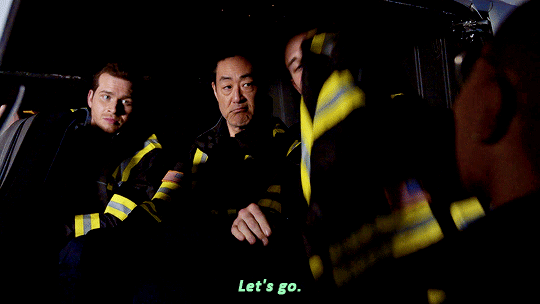
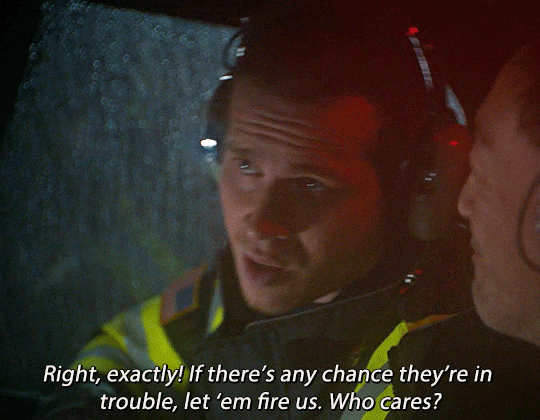
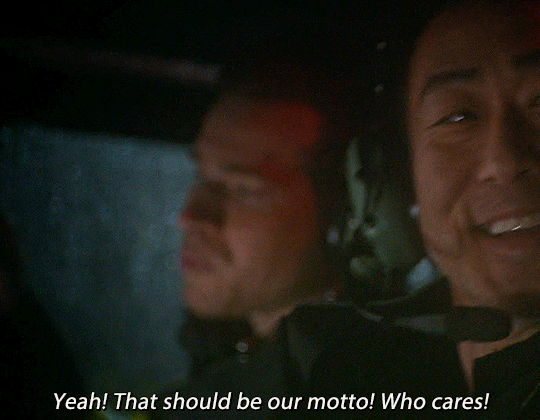

So see what a gift these writers are.
Reward it by making noise.
By being absolutely unhinged about it.
Really, fuck this moment of silence to "Buck's bi growth".... Ship whoever, NOW, - Ravi and Buck and Athena together, if it tickles your brain!!!
Be problematic. Be a freak. Let it show.
Let your freak flag fly. That's how you love the show.
#911 buddie#evan buckley#buddie#eddie diaz#buddie 911#evan buck buckley#911 on abc#911 abc#tv: 911#eddie díaz#abc 911#bisexuality#tommy kinard#LET THE FREAK FLAG FLY#hen wilson#karen wilson#evan buck buckely#bucktommy#oliver stark#tim minear#ryan guzman#lou ferrigno jr#lgbt discourse#lgbtqiia+#lgbtq community#queer#bisexual erasure#queer goggles#queer media#coming out
30 notes
·
View notes